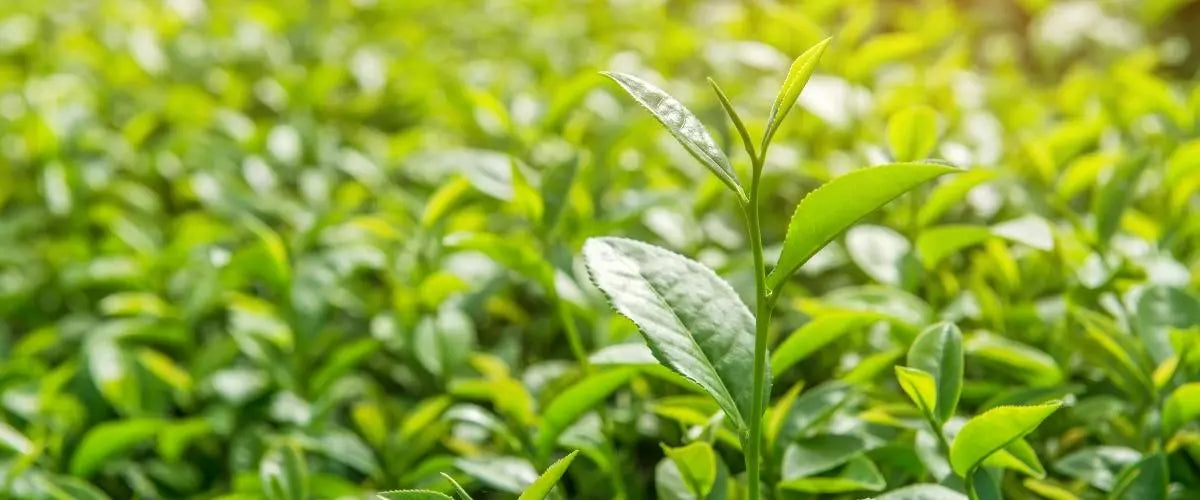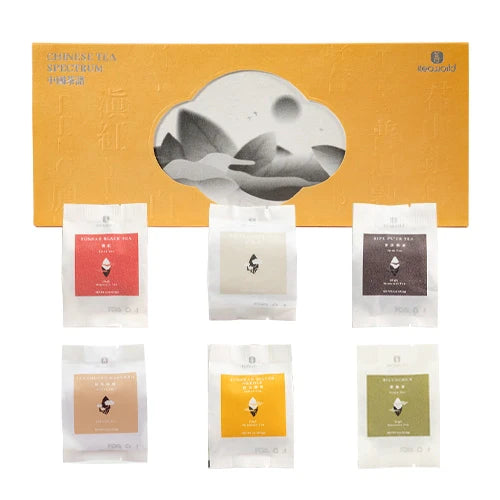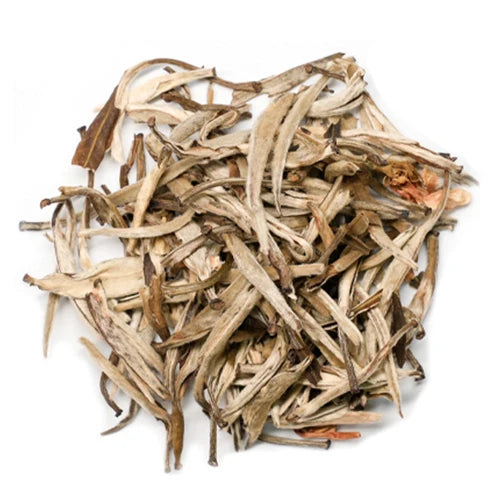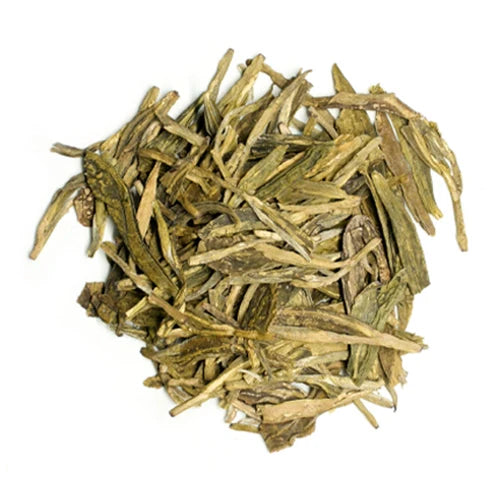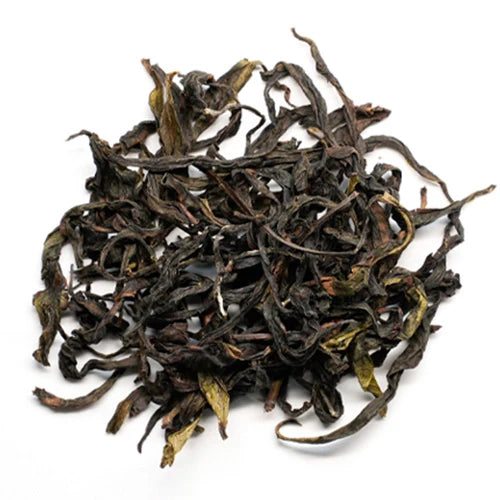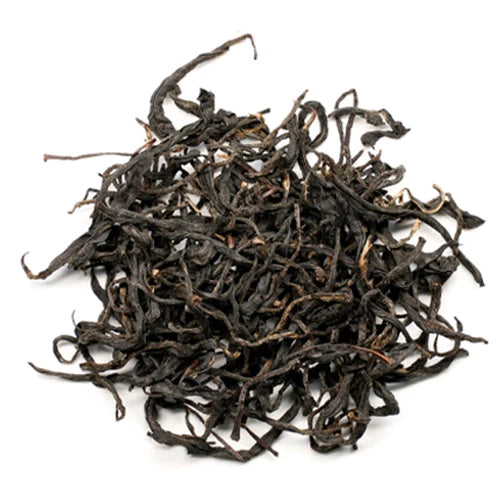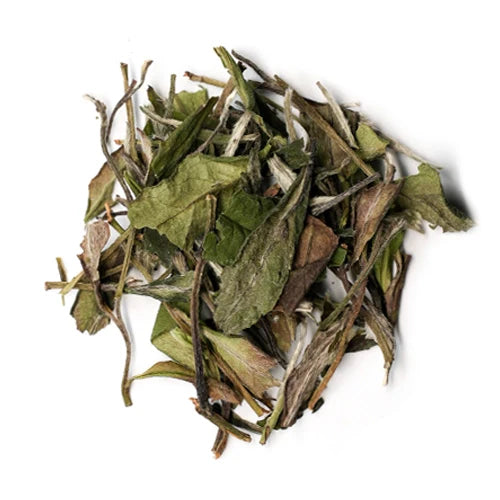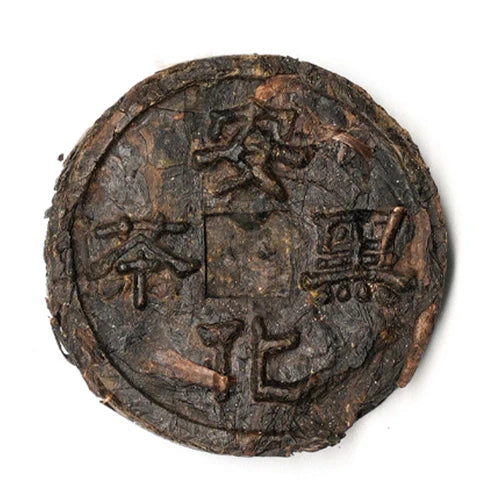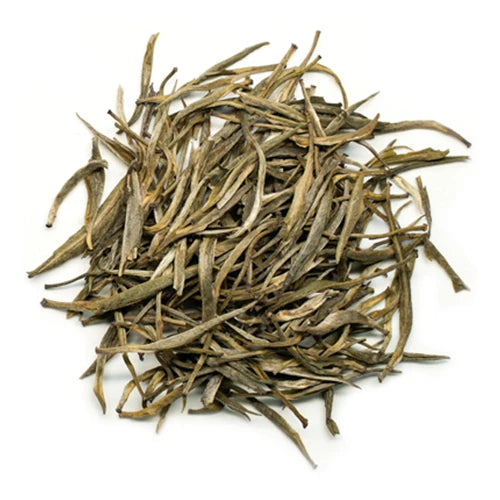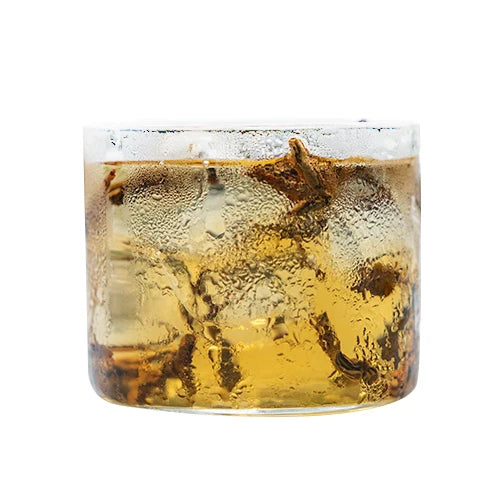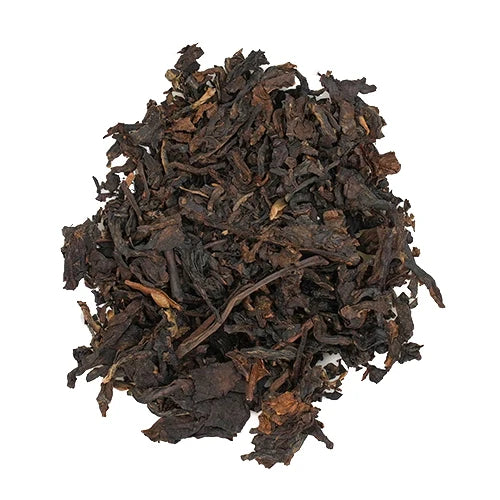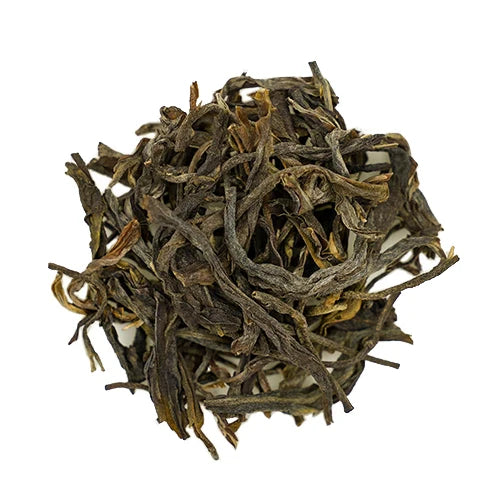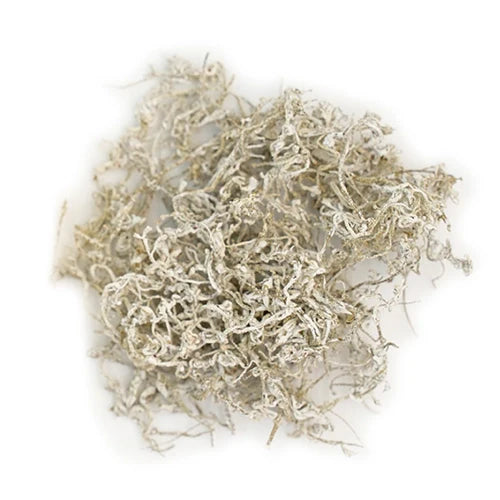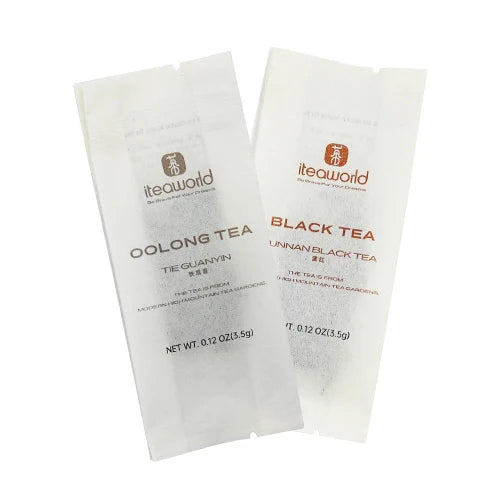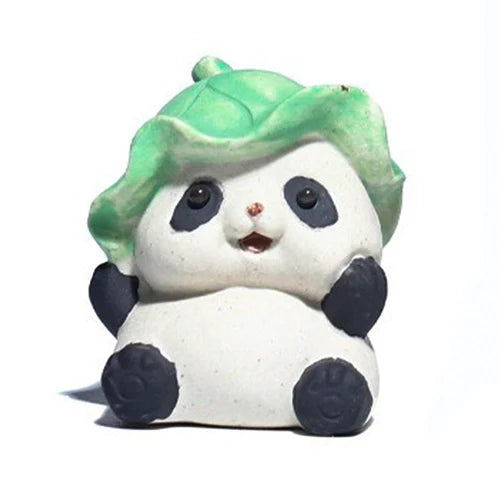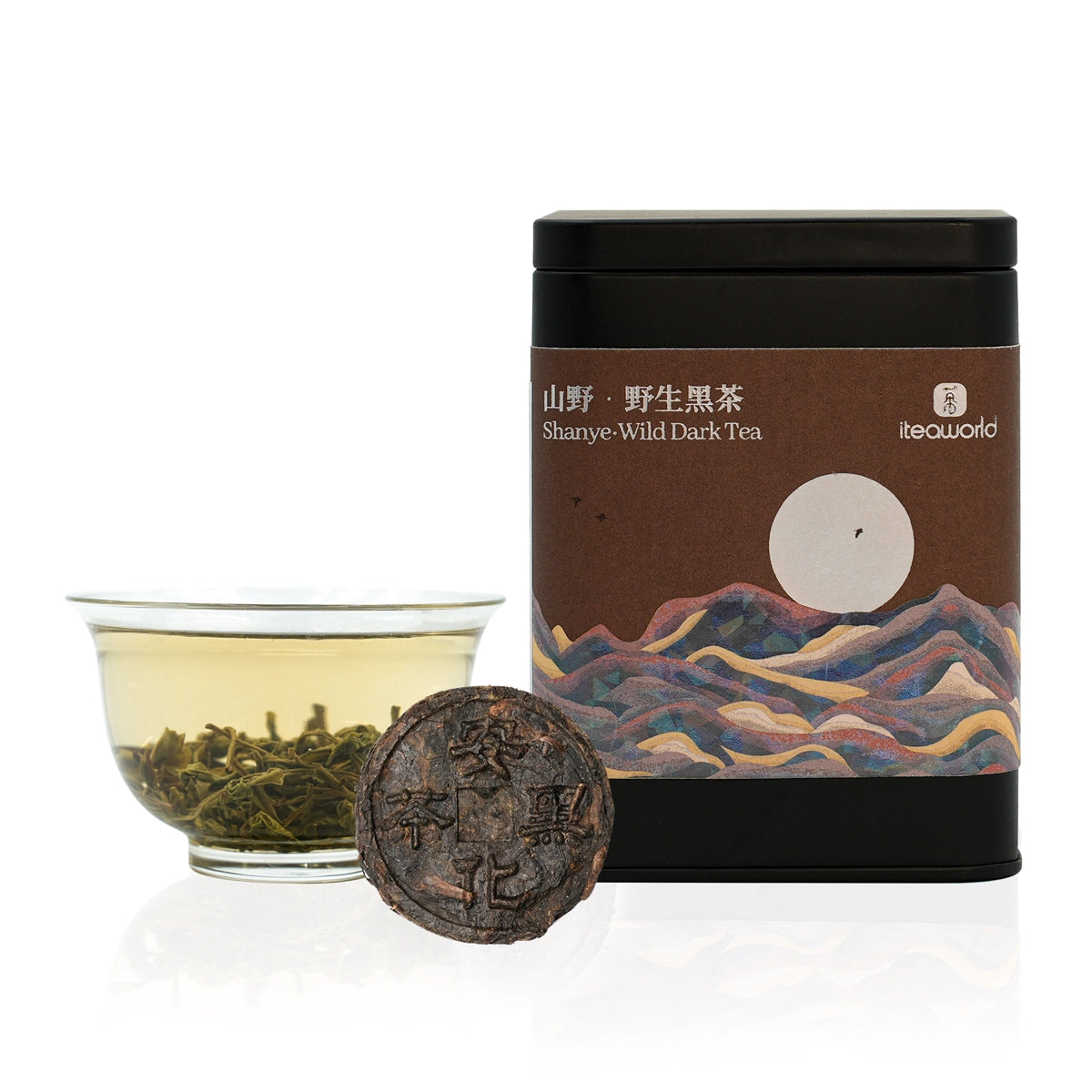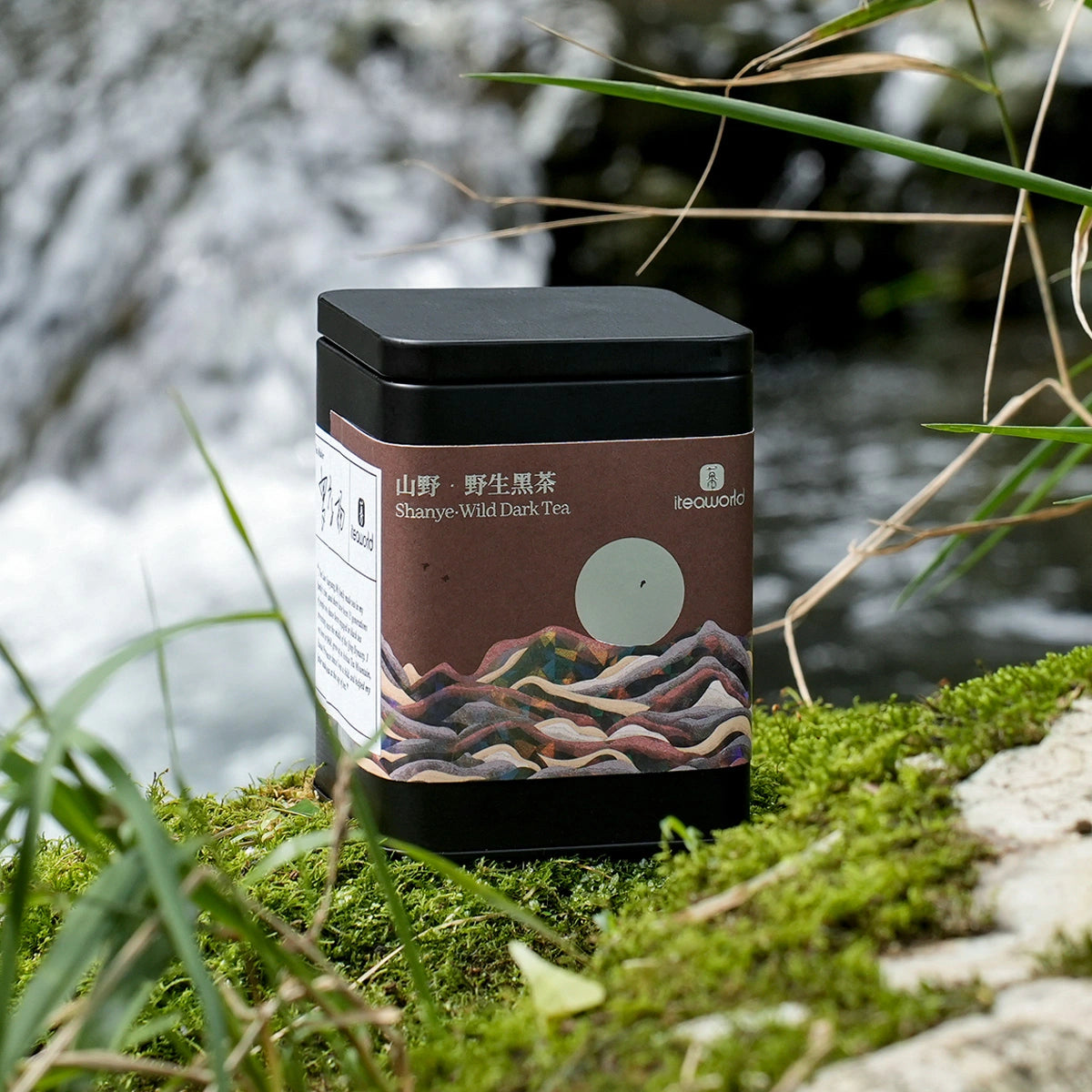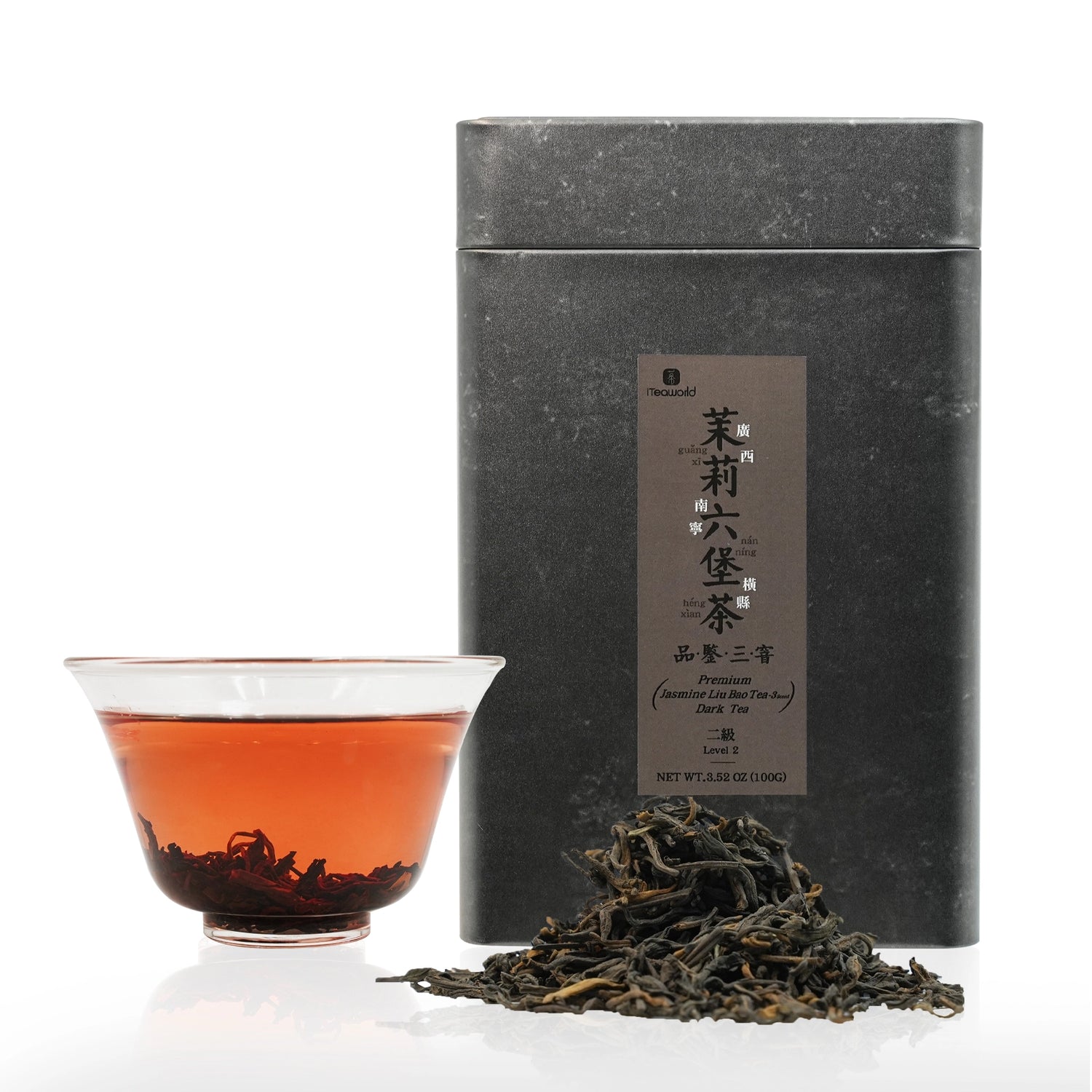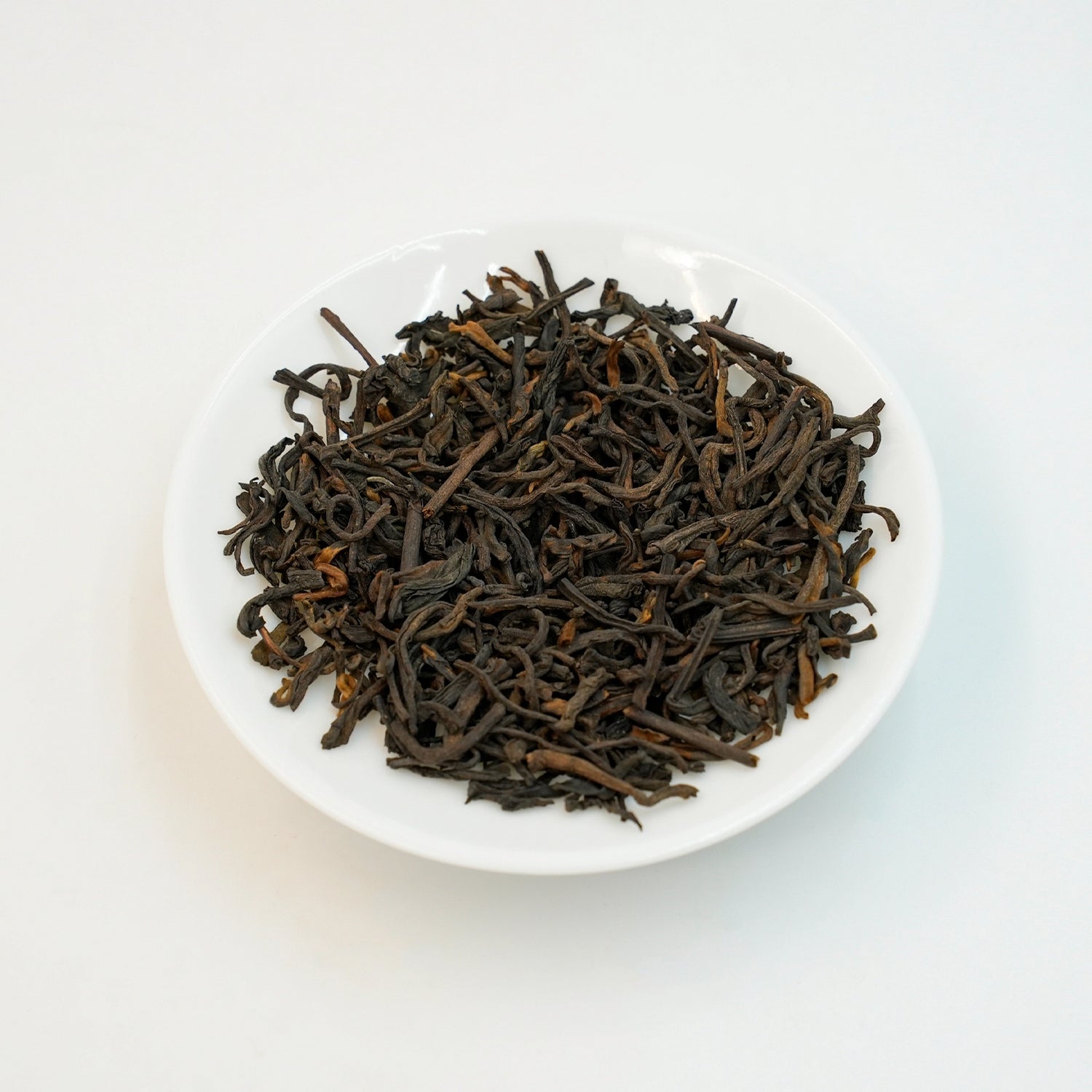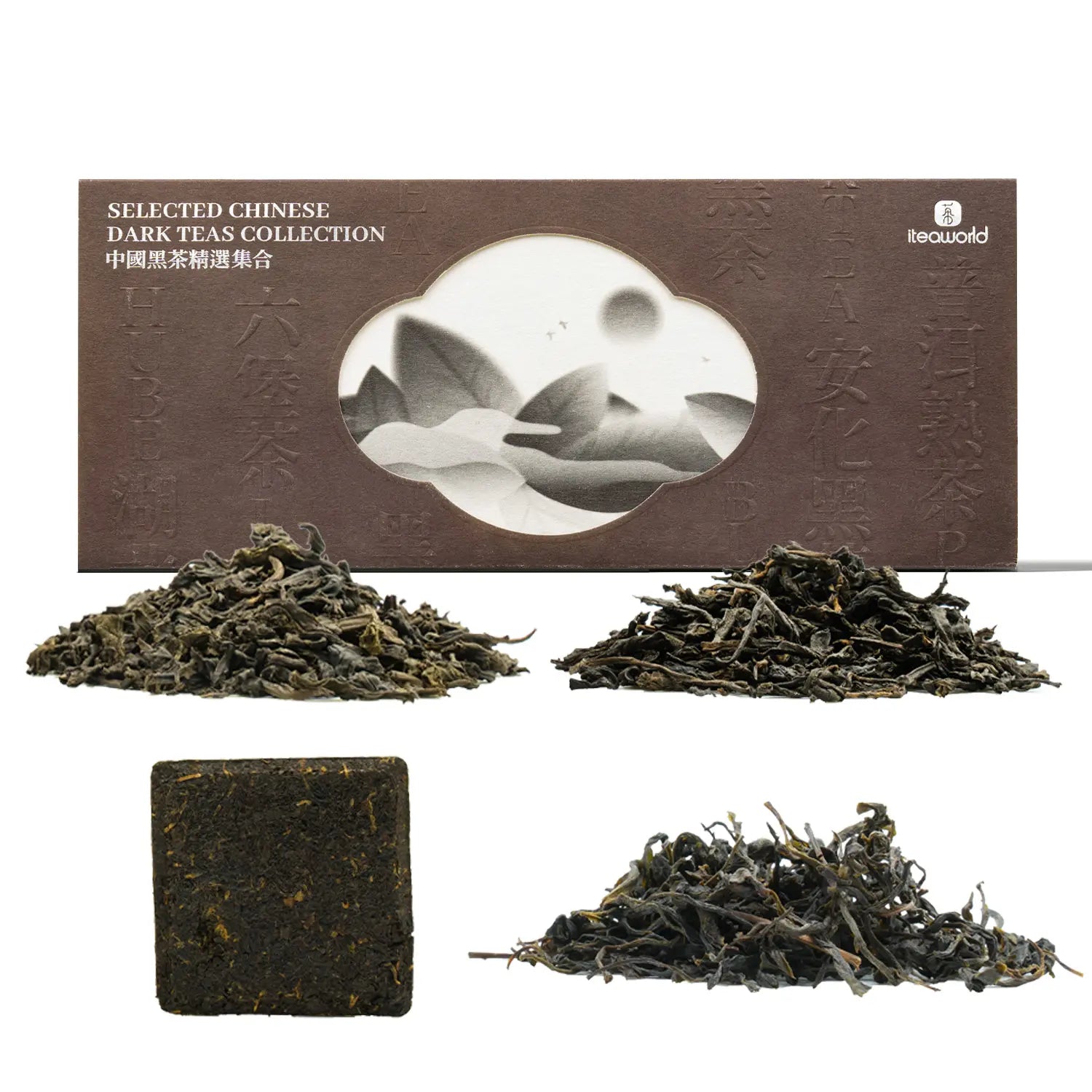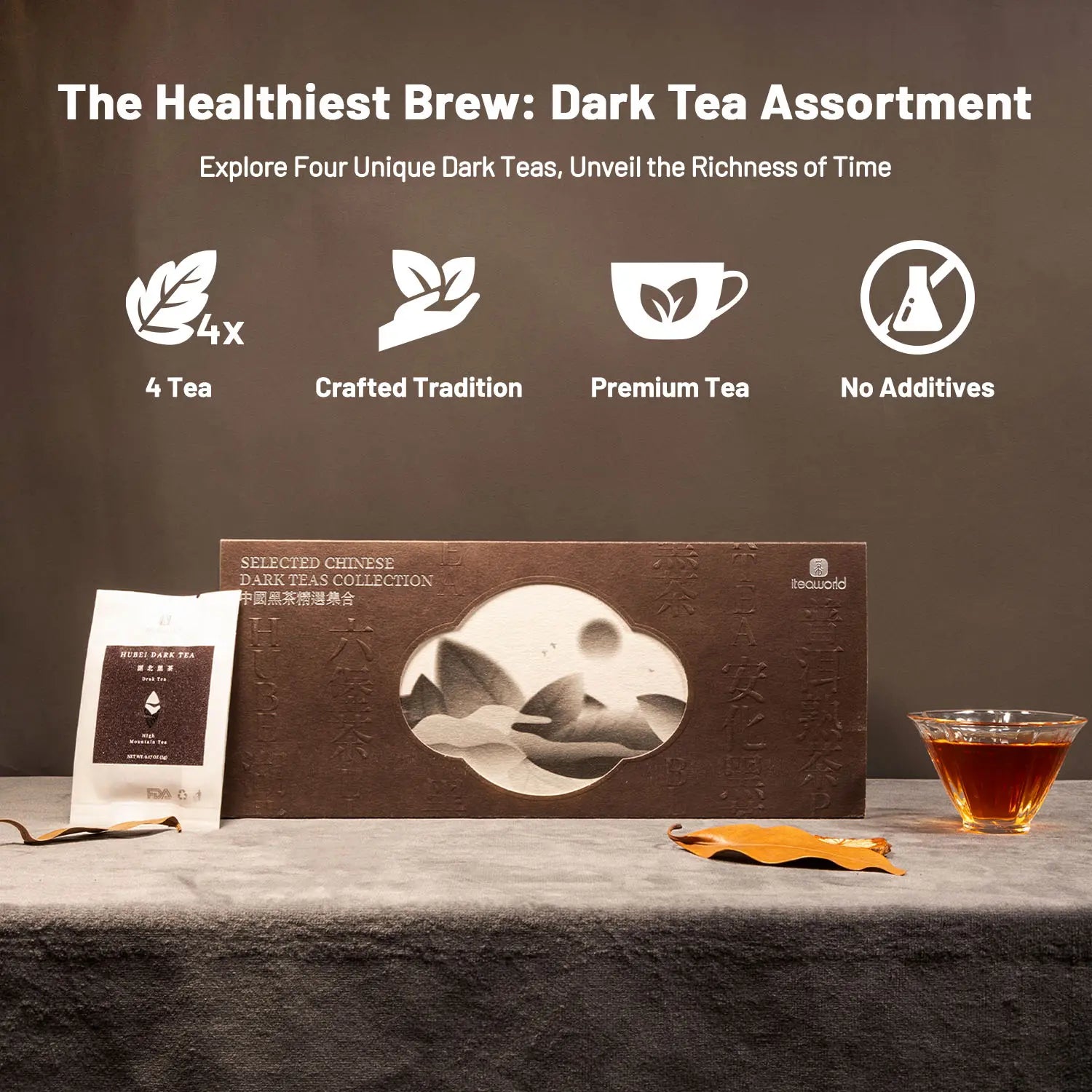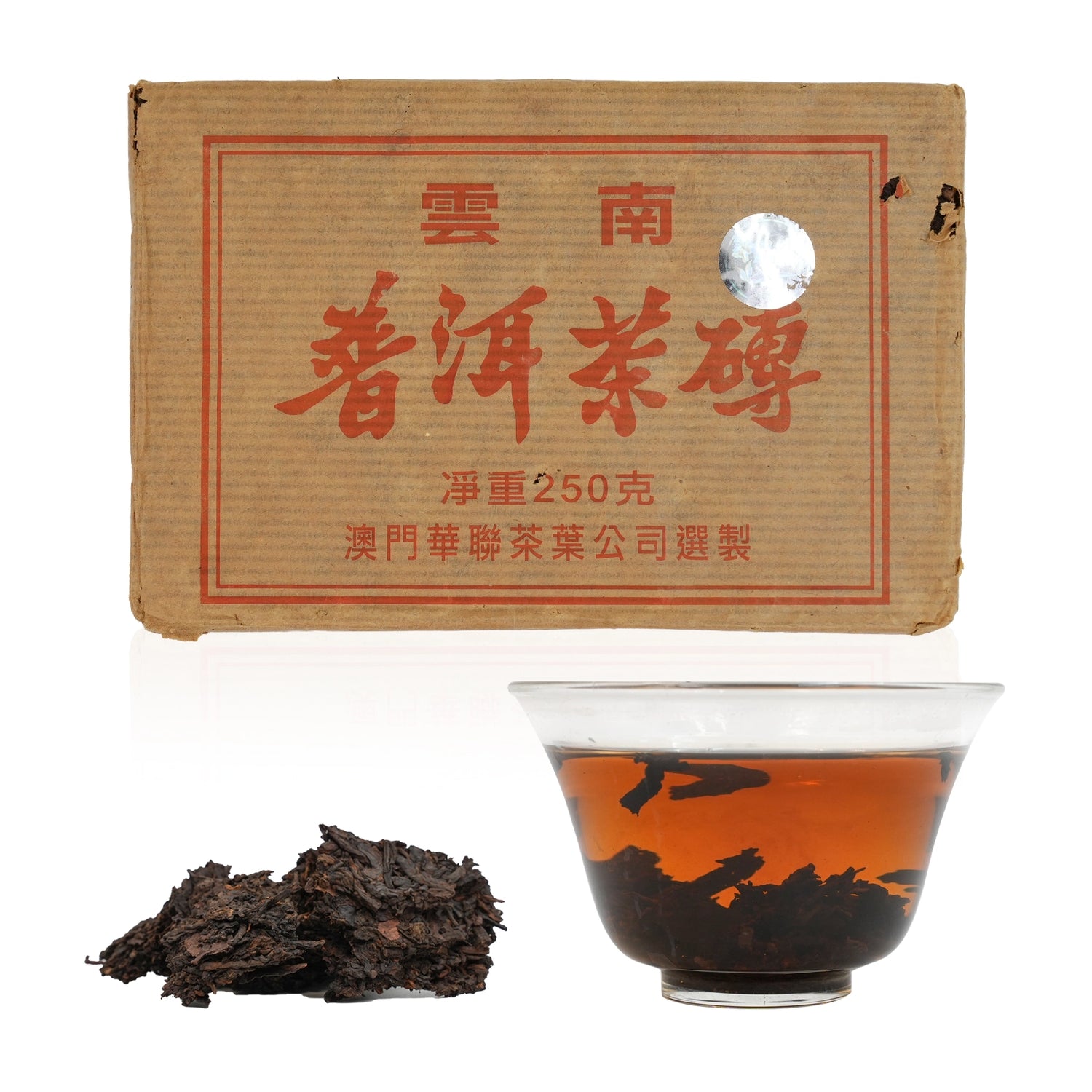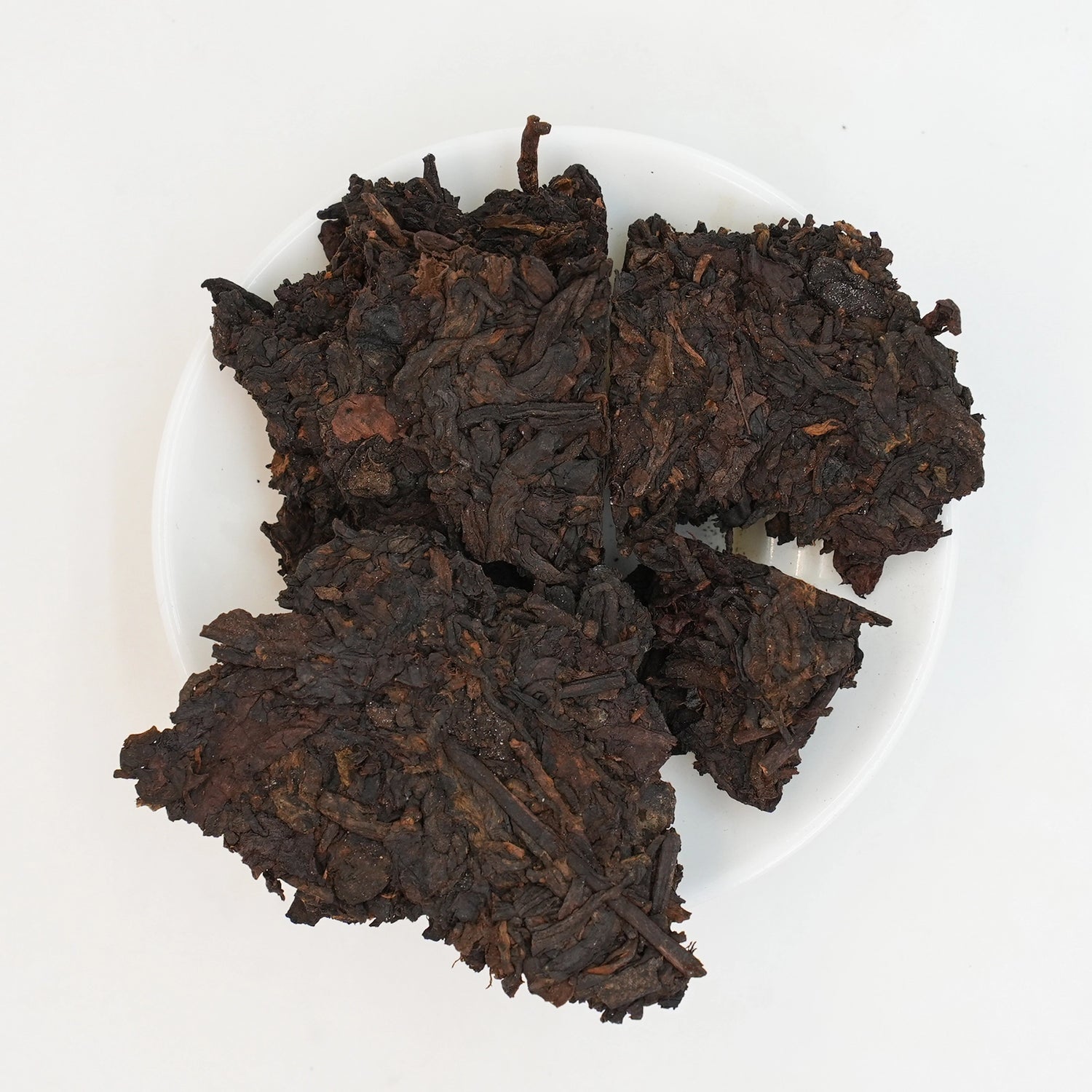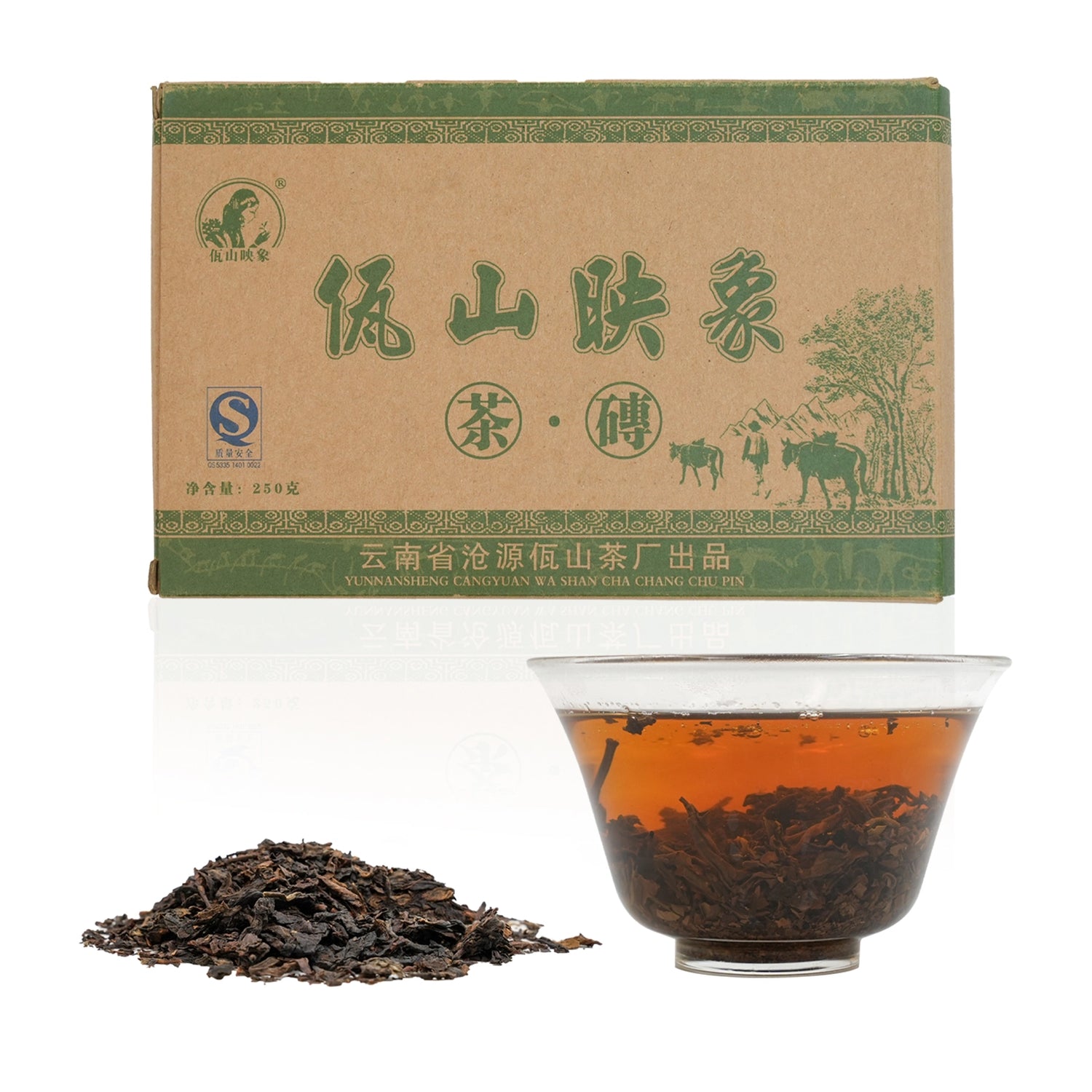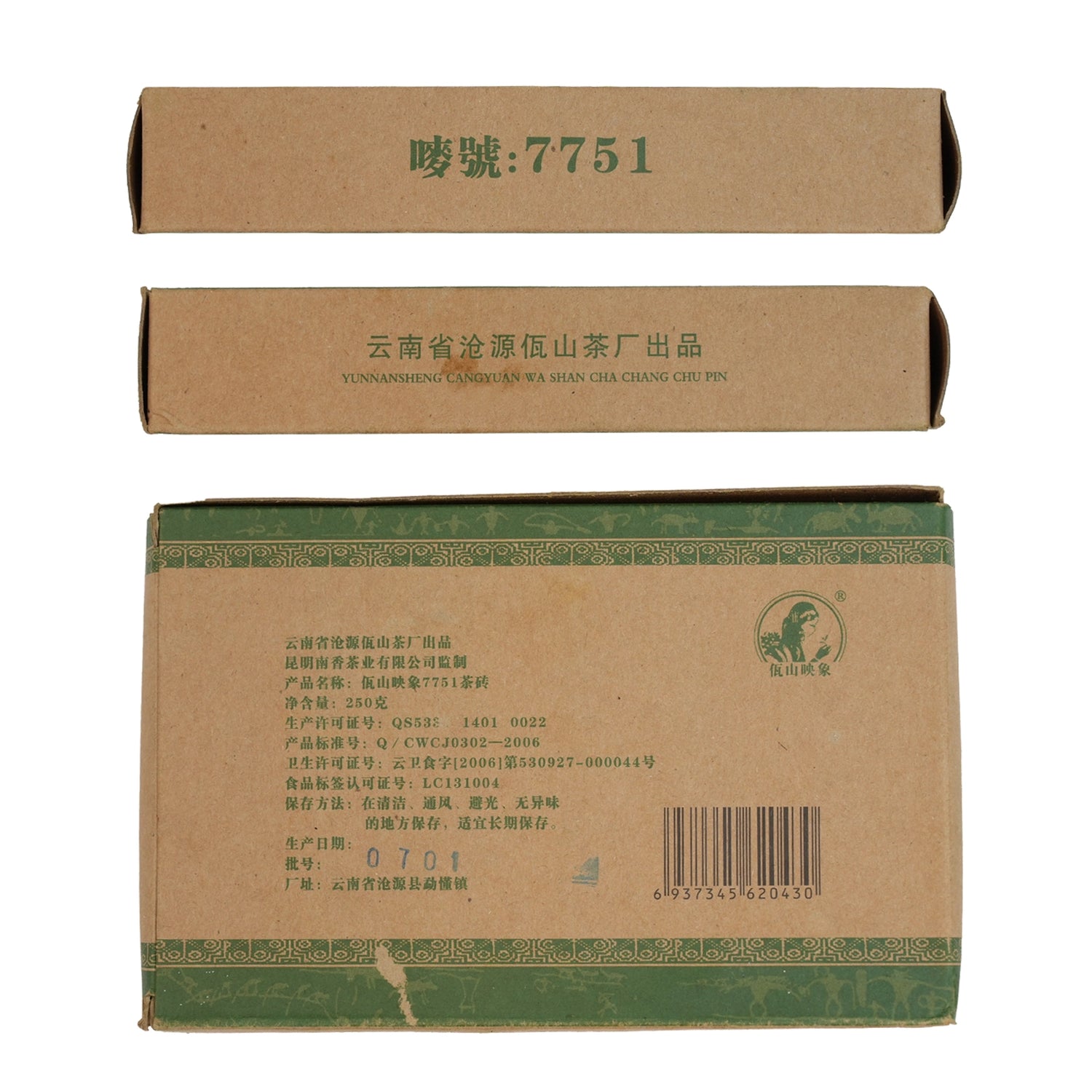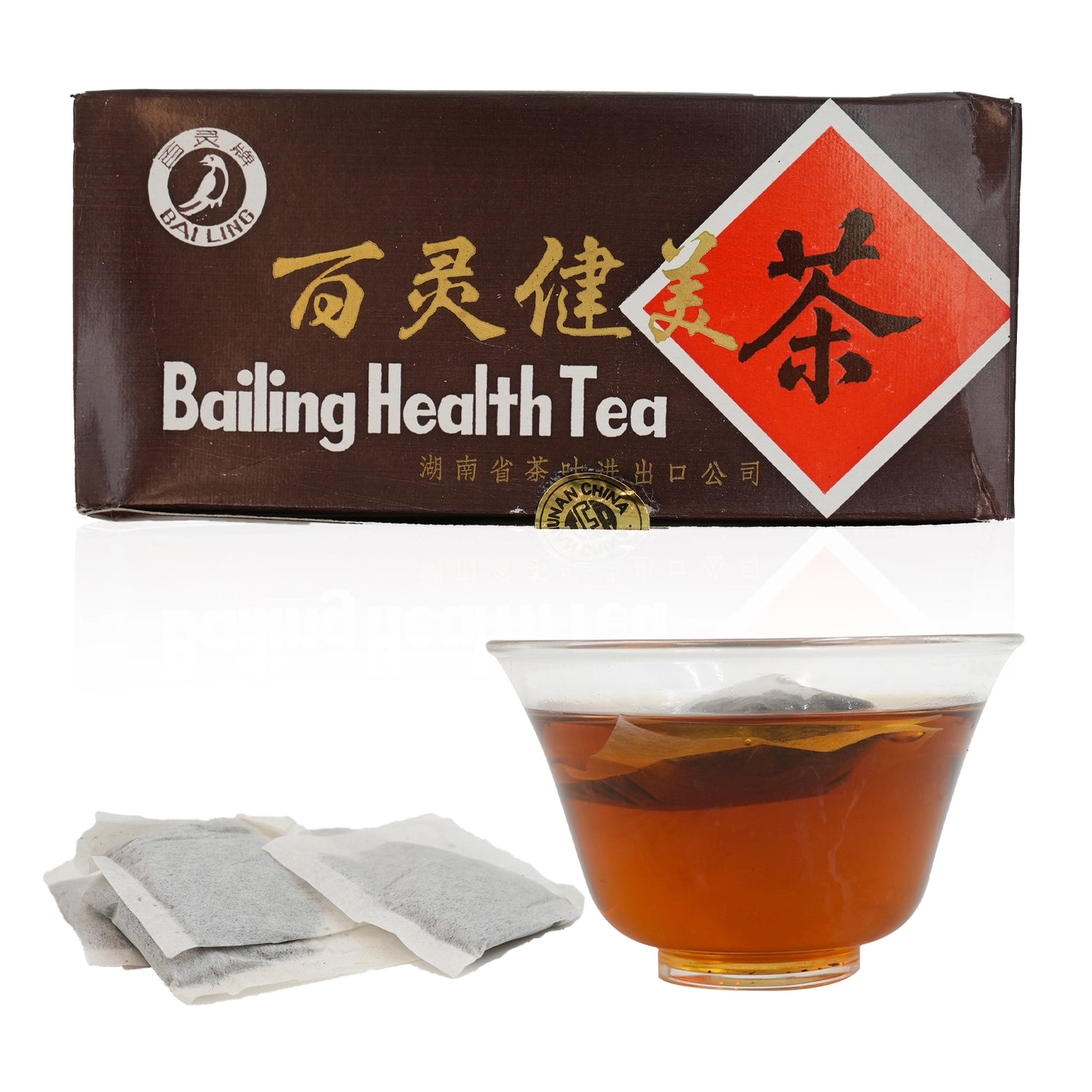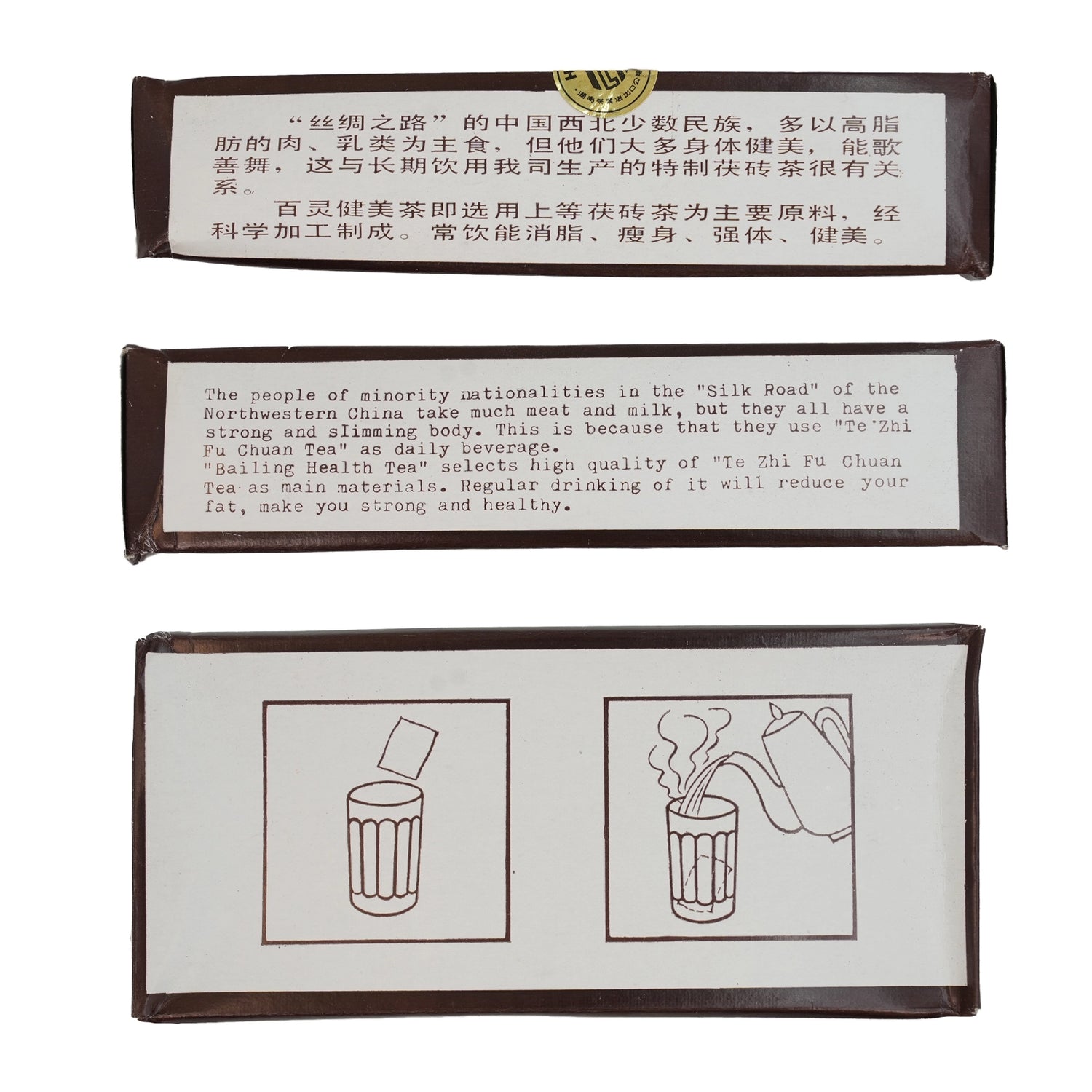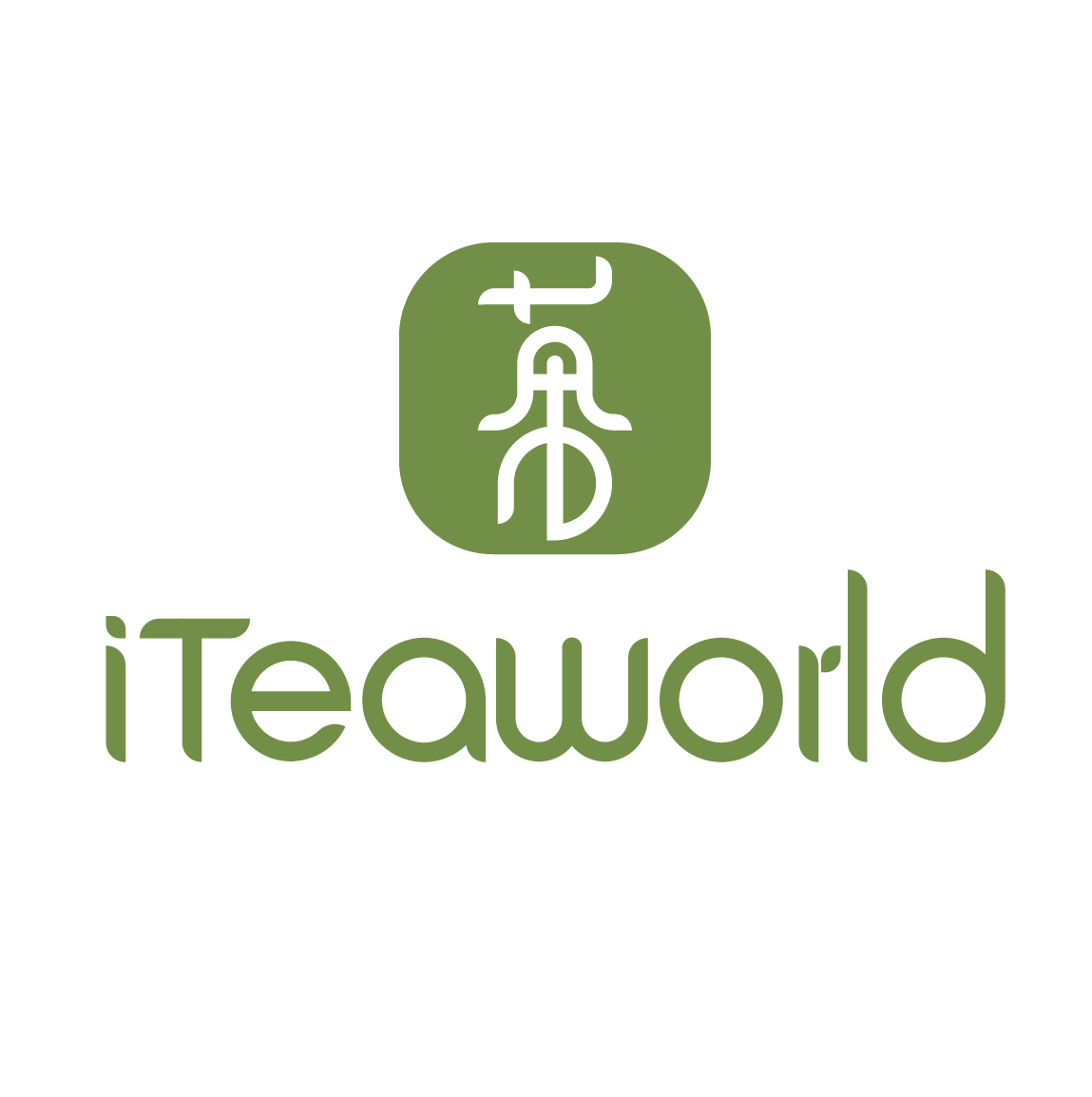Сортировать по:
17 продуктов
17 продуктов
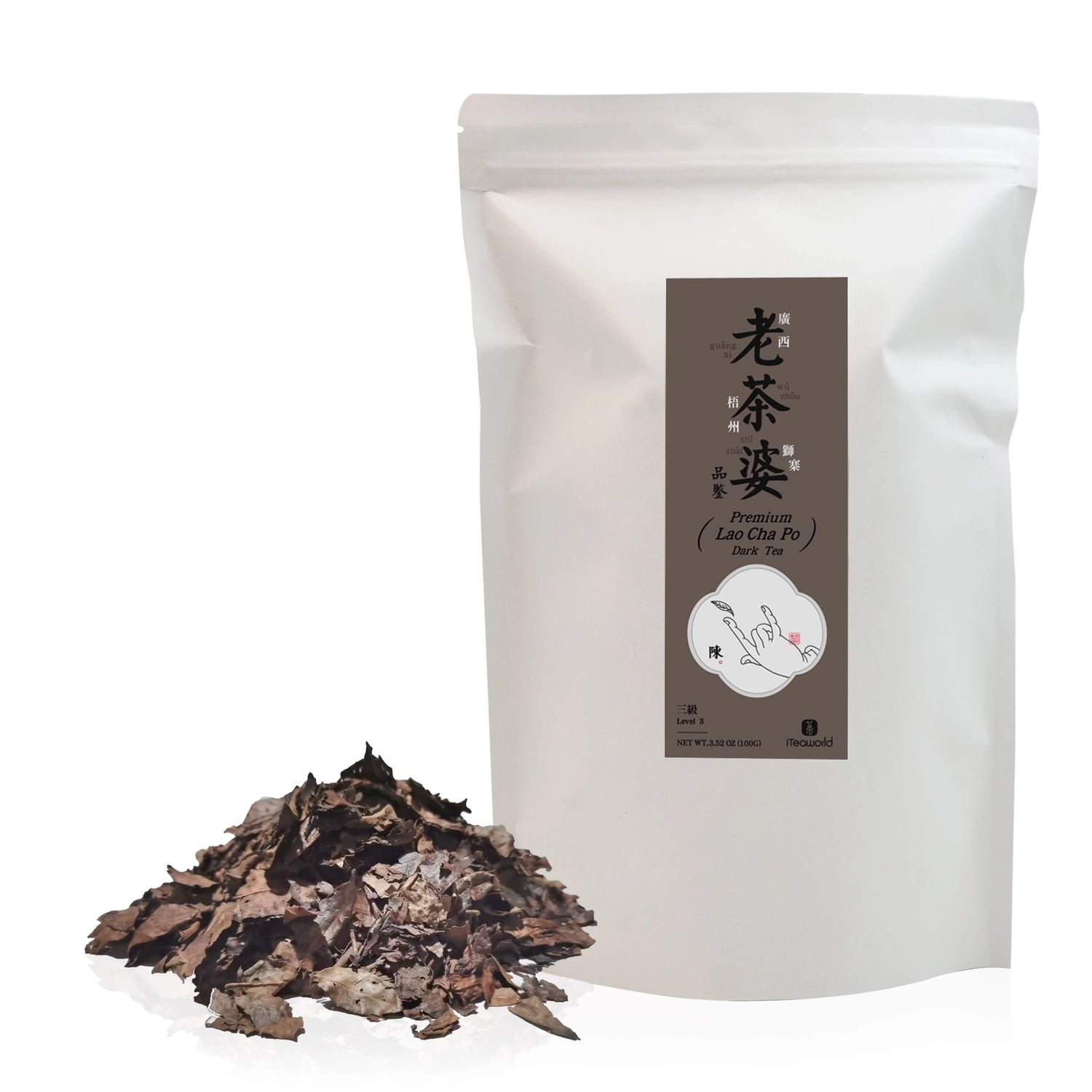

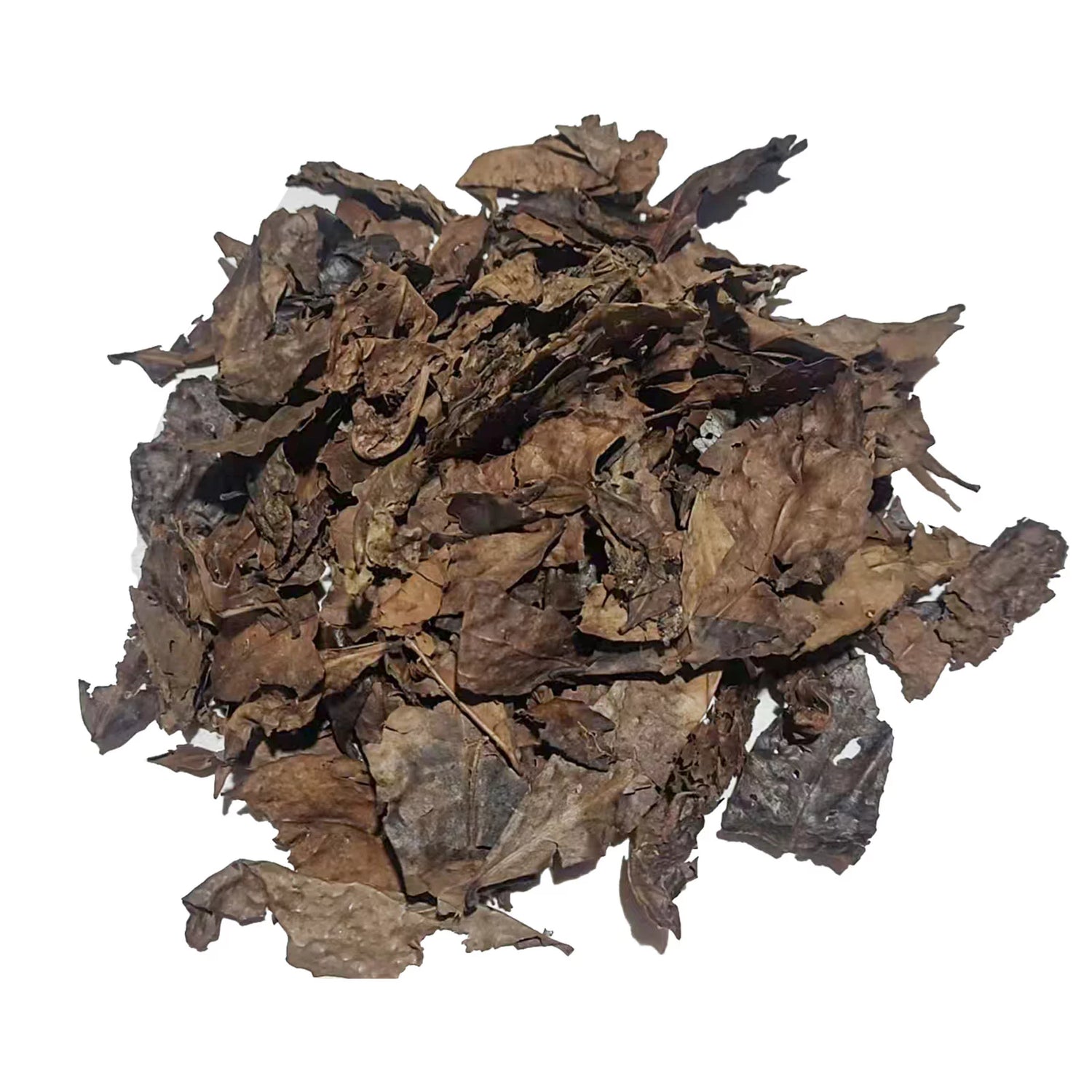
Lao Cha Po Liubao Dark Tea – Aged 2010, Wild Old Trees, Smooth & Sweet
$14.99 USD
Цена за единицу товара заLao Cha Po Liubao Dark Tea – Aged 2010, Wild Old Trees, Smooth & Sweet
$14.99 USD
Цена за единицу товара за“Lao Cha Po” specifically refers to old leaves (not tender buds) harvested one week before and after Shuangjiang (one of China’s 24 solar terms, around October 23, marking the start of colder weather). These are mostly coarse leaves from the current year or 2–3-year-old growth. “Cha Po” is the Liubao people’s respectful name for old leaves. In the past, farmers sold tender buds as high-quality tea, while coarse old leaves were kept as everyday tea. The name reflects the farmers’ wisdom of “making full use of what you have.”
Around Shuangjiang, large temperature differences and reduced rainfall make the old leaves thicker and richer in sugars and nutrients, giving the tea a natural cane sugar sweetness. Tea harvested at this time has less astringency and a smoother, naturally sweet taste.
This Lao Cha Po tea was brewed at the tea bar during the 15th Northwest Tea Festival and loved by everyone, receiving high praise.
This tea is made using the traditional Liubao “picking and cleaning old leaves” method: fresh leaves are briefly blanched in hot water, then sun-dried or air-dried. Blanching reduces bitterness, while the drying process, similar to white tea, preserves most of the tea’s natural compounds.
This batch of Lao Cha Po comes from wild, aged tea trees in Shizhai Town, Wuzhou City, with tree ages of 30–50 years, making the raw material rare. Because it uses old trees, even with only 20 years of aging, the tea exhibits flavor comparable to 30+ years aged tea. The tea has a distinct medicinal aroma and carries the forest-like character unique to old trees, offering a rich and unique flavor.
Дикий черный чай производится в уезде Аньхуа, городе Иян, провинции Хунань, на родине черного чая Аньхуа. Чайные сады в основном расположены в горных районах на высоте 1000 метров. Выращенный в нетронутой экологической среде с обильной растительностью, этот дикий черный чай выращивается без использования химических удобрений и пестицидов, что приводит к ограниченному урожаю — только один весенний урожай в год. Обработанный с использованием техники чая Qiujiang Bopian, он предлагает чистый и стойкий аромат соснового дыма. Вкус насыщенный, мягкий и сладкий, с длительным послевкусием и уникальным ароматом соснового дыма. После употребления во рту остается длительная сладость, оставляющая незабываемые впечатления. Даже после нескольких завариваний он сохраняет свой отличительный аромат.
Введение:
Этот чай Ripe Puer тщательно отобран из осеннего урожая 2020 года. Собранный в высокогорных чайных садах в городе Мэнку, городе Линьцан, провинции Юньнань, на высоте более 1200 метров, этот чай производится из высококачественного материала с одной почкой и тремя листьями. После трех лет выдержки он источает насыщенный, выдержанный аромат с нотками дерева, земли и дымности. Его сбалансированный, мягкий вкус оставляет длительную сладость во рту, сопровождаемую тонкими фруктовыми и цветочными оттенками.
Причины рекомендовать:
- Специальная технология обработки: процесс «мокрого штабелирования» (wo dui) является важнейшим этапом ферментации в изготовлении зрелого чая пуэр. Он включает в себя штабелирование высушенных на солнце чайных листьев на определенную высоту, их поливание водой и покрытие мешковиной для ферментации в теплых и влажных условиях в течение примерно 24 часов. Как только листья достигают желаемого уровня трансформации, их раскладывают для сушки.
- Три года выдержки: выдержка чая пуэр — это естественный процесс окисления и микробной ферментации. В течение этого времени полифенолы, аминокислоты и другие химические соединения в чае постепенно трансформируются, развивая новые ароматы и вкусы. Зрелый чай пуэр в процессе выдержки приобретает еще более сложные ароматы и более гладкую текстуру.
- Высокогорные чайные плантации: этот чай выращивается на высокогорных чайных плантациях на высоте около 1200 метров. Он процветает в среде, где пышная растительность, богатая органикой почва и резкие суточные колебания температуры способствуют накоплению ароматических соединений в листьях.
Степень окисления: Полностью ферментированный
Степень обжарки: Нет
Время обработки: весна 2020 г.
Срок годности: Подходит для длительного хранения.
Сорт чая: Юньнаньский крупнолистовой
Чай Лю Бао с жасмином 2024 года
Для кого это:
Этот чай представляет собой гармоничное сочетание крепких, землистых тонов традиционного чая Лю Бао и свежего, успокаивающего аромата цветов жасмина. Ароматизированный с учетом инноваций, этот выпуск 2024 года сочетает в себе полезные для здоровья свойства темного чая Лю Бао с успокаивающими свойствами жасмина. Результатом является шелковистый, сладкий чайный ликер, в котором яркость жасмина подчеркивает богатый, выдержанный вкус Лю Бао. Идеально подходит для тех, кто ищет расслабления и любит изучать новые методы приготовления чая.
Подробности о чае:
Происхождение: уезд Хэн, Гуанси
Дата сбора урожая: август 2024 г.
Раунды ароматизации: 3 раунда
Чайная основа: темный чай Лю Бао 2023 г.
Сорт чая: смесь крупнолистового чая из Юньнани и местных сортов Гуанси.
Профиль вкуса: свежий аромат жасмина, наложенный на сладкую и мягкую насыщенность чая Лю Бао.
Что делает его особенным: Чай Лю Бао с ароматом жасмина — это передовое ремесло, сочетающее традиции с современными инновациями. Этот чай — восхитительный способ ощутить лучшее из обоих миров.
Как заваривать:
Температура воды: 212°F (или 100℃)
Чай-вода: 1 г на 20 мл
Время заваривания: отбросьте первые 2 заваривания; 20 секунд для 3-го–5-го заваривания, добавляйте по 5 секунд каждый раз после
Чайная утварь: белая фарфоровая гайвань или глиняный чайник.
Повторное заваривание: 7+ раз
Чай «Жасмин Лю Бао»
Чай «Жасминовый Лю Бао» производится в Хэнсяне, известном как «столица жасмина» Китая, и представляет собой уникальную смесь традиционного чая «Лю Бао» и ароматных ноток свежих цветов жасмина.
Для создания этого чая свежие, цветущие цветы жасмина тщательно смешиваются с выдержанными листьями чая Лю Бао в процессе ароматизации, что позволяет чаю впитать сладкий, свежий аромат жасмина. В результате получается чай, который сочетает в себе мягкий, насыщенный и мягкий вкус чая Лю Бао — разновидности темного чая, известного своими полезными свойствами — со свежим, чистым ароматом цветов жасмина.
Почему вам это понравится:
Богатый, сложный вкус: Насладитесь глубоким, мягким вкусом выдержанного чая Лю Бао с освежающими нотками жасмина.
Польза для здоровья: чай Лю Бао известен своими пищеварительными и детоксикационными свойствами, а жасмин придает ему успокаивающий и смягчающий эффект.
Отсутствие затхлого привкуса: хотя многие выдержанные чаи могут иметь сильный затхлый привкус, жасмин помогает устранить его, оставляя чистый, свежий вкус.
Освежающий и успокаивающий: жасмин придает легкий цветочный аромат, который превращает чай в по-настоящему успокаивающее наслаждение, делая его идеальным для отдыха в любое время дня.
Эта смесь полезного темного чая и цветочной свежести идеально подойдет тем, кто ищет уникальный, ароматный чай, обладающий одновременно глубиной и сбалансированностью — идеальный вариант для повседневного наслаждения или в качестве особого подарка любителям чая.
Введение:
Этот чай Liubao 2018 года собран в высокогорных чайных садах в Гуйлине, Гуанси, и изготовлен из высококачественного материала с одной почкой и тремя листьями. После пяти лет выдержки чай прошел достаточную ферментацию и трансформацию, развив уникальный вкусовой профиль с характерным ароматом ореха бетеля, ярко-красным ликером и мягким, мягким вкусом со слегка сладким послевкусием.
Причины рекомендовать:
- Основная производственная зона: выращивается в городе Любао, городе Учжоу, Гуанси, где средняя годовая температура составляет 21,1°C, годовое количество осадков составляет 1503,6 мм, а годовая продолжительность солнечного сияния составляет 1915 часов. Обильные осадки и обширная горная местность создают идеальные условия для выращивания чая.
- Уникальный аромат: «Аромат ореха бетеля» чая Любао происходит от слабого «аромата соснового дыма» в свежезаваренном чае, который после длительной выдержки превращается в характерный «аромат ореха бетеля». Этот аромат создает длительное «охлаждающее» ощущение во рту.
- Богатая история: Чай Любао процветал во времена династий Тан и Сун и достиг пика популярности во времена династий Мин и Цин. В период Цзяцин династии Цин он был признан одним из 24 знаменитых чаев Китая за свой уникальный аромат ореха бетеля.
- Двойная польза: черный чай Любао занимает особое место в традиционной китайской медицине. Он одновременно охлаждающий и согревающий, как говорят, устраняет избыток сырости, одновременно обеспечивая тепло при необходимости.
Степень окисления: Никто
Степень обжарки: Никто
Почва чайного сада: Желтая почва
Мастер купажа: Лю Юнцян
Время обработки: 2018
Срок годности: Подходит для постоянного хранения.
Сорт чая: сорт группы Гуанси
Введение:
Этот темный чай Anhua тщательно отобран из осеннего урожая 2021 года. Собранный с диких чайных плантаций в уезде Аньхуа провинции Хунань, он соответствует стандарту сбора одной почки и трех листьев. Признанный мировым чайным и медицинским сообществом одним из самых полезных напитков 21 века, этот чай источает уникальный аромат соснового дыма при заваривании, предлагая чистый, мягкий и сладкий вкус с длительным послевкусием.
Причины рекомендовать:
- Специальная технология обработки: черный чай Anhua проходит уникальный процесс «мокрой укладки» (wo dui) дважды — один раз во время первичной обработки необработанного чая и еще раз во время конечной обработки продукта. Этот процесс использует температуру и влажность чайных листьев после фиксации, позволяя микроорганизмам в воздухе взаимодействовать с листьями, что приводит к трансформации внутренних соединений чая.
- Премиальное качество: этот темный чай Аньхуа (Тяньцзянь) считается лучшим сортом, доступным на рынке, и исторически ценился как подношение императорам.
- Уникальный аромат: Особый этап в производстве темного чая Аньхуа — обжарка в печи «Семь звезд». Во время этого процесса сосновые дрова сжигаются под печью, а сосновый дым направляется в чайные листья, придавая им характерный аромат соснового дыма во время сушки.
Уровень окисления: Мокрое брожение
Уровень обжарки: копчение в печи Seven Star Sove
Почва чайной плантации: выветренная сланцевая почва
Время обработки: 2021 г.
Срок годности: Подходит для длительного хранения.
Сорт чая: сорт группы Аньхуа
Введение:
Этот темный чай Хубэй тщательно отобран из осеннего урожая 2022 года. Собранный с высокогорных чайных плантаций в городе Чжаолицяо провинции Хубэй, он соответствует стандарту сбора одной почки и трех листьев. Этот чай является разновидностью темного чая Хубэй, известного как «Ми Чжуань Ча» (чай из рисовых кирпичей), известного своим уникальным вкусовым профилем. Чайный ликер насыщенный и крепкий, с легкой первоначальной горечью, которая переходит в продолжительное сладкое послевкусие. Он в первую очередь источает цветочный и медовый аромат, сопровождаемый тонким выдержанным ароматом.
Причины рекомендовать:
- Уникальное сырье: Ми Чжуань Ча — это особый чай, производимый в городе Чиби провинции Хубэй, известном как «Родина китайского кирпичного чая». Это прессованный черный чай, полностью изготовленный из чайной пыли, что и дало ему название «рисовый кирпичный чай».
- Отличительный внешний вид: Готовый Mi Zhuan Cha визуально поражает острыми краями, гладкой поверхностью, украшенной замысловатыми узорами, и глянцевым черным кирпичным цветом. При заваривании получается темно-красный напиток с чистым ароматом и богатым, мягким вкусом.
- Высокогорные чайные сады: Чайные деревья растут на больших высотах, где значительные суточные колебания температуры замедляют их рост. Обильный туман и влага питают чайные деревья, обогащая листья питательными веществами и в результате чего чай приобретает крепкий вкус и сильный аромат.
Степень окисления: Мокрая укладка с последующим прессованием паром при высокой температуре
Степень обжарки: Нет
Почва чайной плантации: желто-коричневая почва
Время обработки: осень 2022 г.
Срок годности: Подходит для длительного хранения.
Сорт чая: сорт группы South Hubei
В процессе выдержки и транспортировки выдержанного чая упаковка и сам чай могут быть повреждены. Пожалуйста, будьте осторожны при покупке, если вас это беспокоит.
Рекомендуемая покупка
Этот кирпичный чай пуэр из Юньнаня 1998 года — замечательный продукт, созданный известной компанией Macao Hualian Tea Company. Кирпичный чай был изготовлен по индивидуальному заказу на фабрике Menghai Tea Factory с использованием отборных крупнолистовых листьев чая из Юньнаня. После 29 лет естественного сухого хранения в Дунгуане чай приобрел насыщенный камфарный и выдержанный аромат с мягким, сладким и мягким вкусом. Внешний вид кирпича плоский с четкими краями и углами, однородной толщиной и темно-коричневым цветом. Настой имеет яркий оранжево-желтый оттенок с небольшим осадком. Этот чай — отличный выбор для любителей пуэра и коллекционеров, ищущих выдержанный, высококачественный чай с исторической значимостью.
Основные сведения о кирпичном чае пуэре Юньнань 1998 года
- Происхождение: провинция Юньнань, Китай.
- Дата производства: 1998
- Класс: Второй класс
- Сорт чая: Юньнаньский крупнолистовой чай
- Мастерство: Изготовлено по индивидуальному заказу на фабрике чая Мэнхай для компании Macao Hualian Tea Company; традиционные методы обработки и прессования.
- Особенности вкуса: выраженный камфорный и выдержанный аромат; мягкий, сладкий и мягкий вкус
- Хранение: Естественное хранение на сухом складе в Дунгуане; хорошая сохранность без затхлого запаха.
Что такое кирпичный чай пуэр из Юньнани?
Чай пуэр из Юньнаня в кирпичах — это тип прессованного чая, изготовленного из сортов чая Юньнань с крупными листьями. Чай проходит процесс окисления, во время которого его пропаривают и прессуют в кирпичи для выдержки. Со временем чай приобретает сложные вкусы и ароматы, становясь более мягким и мягким. Чай пуэр в кирпичах высоко ценится за свой потенциал выдержки и часто востребован коллекционерами и любителями чая.
О компании Macao Hualian Tea Company
Macao Hualian Tea Company, основанная в 1965 году г-ном Цзэн Чжихуэем и четырьмя патриотически настроенными зарубежными китайскими партнерами, сыграла ключевую роль в чайной промышленности. Название «Hualian» означает единство зарубежных китайцев в бизнесе. В 1960–1980-х годах компания тесно сотрудничала с Guangdong Tea Import and Export Corporation, выступая в качестве важнейшего канала для экспорта китайского чая на международные рынки. Примечательно, что Hualian обладала эксклюзивными правами единственного дистрибьютора China Tea Import and Export Company в Макао, контролируя более 90% доли местного рынка. Их кирпичи чая пуэр, особенно те, которые производятся в партнерстве с Menghai Tea Factory, ценятся за свое качество и стали желанными предметами среди коллекционеров чая.
Рекомендуемые методы заваривания
-
Гайвань Пивоварение
- 100мл Гайвань
- 95 ℃ -100 ℃
- 5-7 раз
- 1:15 - 1:25
- 10~20 секунд
-
Термос для заваривания
- 1 г чая на 100 мл (3,4 унции) воды
- Используйте кипящую воду (212 ° F)
- Время настаивания: 1-2 часа
- Инструмент: Термос с изоляцией
-
Метод кипячения
- Добавьте 1 г чая на 100 мл (3,4 унции) воды.
- Кипятить 1-2 минуты, затем дать постоять 2-3 минуты.
- Повторно заваривать, кипятя на 3 минуты дольше с каждым завариванием.
- Для оптимального вкуса используйте керамический или стеклянный чайник.
- Наслаждайтесь 3-4 порциями кофе
Правила хранения
Храните этот чай в сухом, прохладном месте с уровнем влажности ниже 45% и температурой ниже 25 ° C (77 ° F). Берегите его от сильных запахов, света и воздействия воздуха. Правильное хранение гарантирует, что чай сохранит свой вкус и продолжит изящно стареть с течением времени.
Вес и упаковка
- Вес нетто: 250 г
- Тип упаковки: В бумажной обертке
В процессе выдержки и транспортировки выдержанного чая упаковка и сам чай могут быть повреждены. Пожалуйста, будьте осторожны при покупке, если вас это беспокоит.
Рекомендуемая покупка
Этот брикет сырого чая пуэр 2007 года Wa Mountain Impression "7751" курируется г-жой Тан Мэй, бывшим старшим инженером и начальником отдела контроля качества чайной фабрики Куньмина. Следуя традиционным рецептам, он отбирает высококачественные высушенные на солнце зеленые материалы с высоких арборовых деревьев в бассейне реки Ланьцан в Юньнани и тщательно обрабатывается и прессуется с использованием оригинальных методов изготовления кирпичей чайной фабрики Куньмина. Чай наследует суть кирпичного чая чайной фабрики Куньмина с однородной и аккуратной формой кирпича, прозрачными и ровными полосками, открытыми почками и волосками, ярким оранжево-желтым цветом супа, свежим и сильным ароматом, мягким и освежающим вкусом и очевидной возвращающейся сладостью и слюноотделением. Это отличный выбор для ежедневного питья и коллекционирования.
Основные сведения о чайном кирпиче Wa Mountain Impression 2007 года
- Происхождение: Чайная фабрика Cangyuan Wa Mountain, провинция Юньнань, Китай
- Дата производства: 2007
- Класс: Второй класс
- Сорт чая: Юньнаньский крупнолистовой чай
- Мастерство: традиционная технология изготовления кирпичей Куньминской чайной фабрики, высушенный на солнце зеленый чай, спрессованный в кирпичи.
- Особенности вкуса: Яркий оранжево-желтый цвет супа, свежий и сильный аромат, мягкий и освежающий вкус, очевидная возвращающаяся сладость и слюнотечение, насыщенный, аутентичный вкус, напоминающий вкус выдержанного необработанного чая примерно 1995 года.
- Хранение: Естественное хранение в Дунгуане с небольшой сухостью, без посторонних привкусов.
Что такое чайный кирпич Wa Mountain Impression?
Wa Mountain Impression Tea Brick — это чайный продукт пуэр, производимый Yunnan Cangyuan Wa Mountain Tea Factory. Чайная фабрика владеет более чем 6000 акрами экологически чистых высокогорных чайных садов, при этом основная база чайных садов расположена в Tuanjie Dazhai, город Yanshuai, уезд Cangyuan, на высоте более 1800 метров. Климат мягкий, осадки обильные, а район окутан облаками и туманом, вдали от загрязнения, что делает его идеальным местом для выращивания чая. Чайная фабрика строго управляет чайными садами в соответствии с техническими спецификациями Международной федерации движения за органическое сельское хозяйство (IFOAM), гарантируя превосходное качество источников чая Wa Mountain Impression.
Рекомендуемые методы заваривания
-
Гайвань Пивоварение
- Соотношение чая и воды: 1:20
- Температура воды: 95 ° С-100 ° С
- Настои: 6-8 раз
- Время заваривания: 10-20 секунд.
-
Термос для заваривания
- Соотношение чая и воды: 1 г на 100 мл воды.
- Температура воды: 100 ° C (кипящая вода)
- Время настаивания: 1-2 часа
- Инструмент: Термос с изоляцией
-
Метод кипячения
- Соотношение чая и воды: 1 г на 100 мл воды.
- Время закипания: 1-2 минуты, затем дайте постоять 2-3 минуты.
- Повторное заваривание: продлите время заваривания на 3 минуты для каждого дополнительного заваривания.
- Подходит для: керамического или стеклянного чайника.
- Время заваривания: 3-4 заваривания
Правила хранения
Чтобы поддерживать оптимальный процесс выдержки чая , храните его в сухом и прохладном месте с влажностью ниже 45% и температурой ниже 25 ° C. Берегите его от сильных запахов, прямого света и воздействия воздуха. Правильное хранение гарантирует, что чай сохранит свой выдержанный аромат и продолжит изящно созревать с течением времени.
Вес и упаковка
- Вес нетто: 250 г (8,8 унций)
- Упаковка: Оригинальная бумажная коробка.
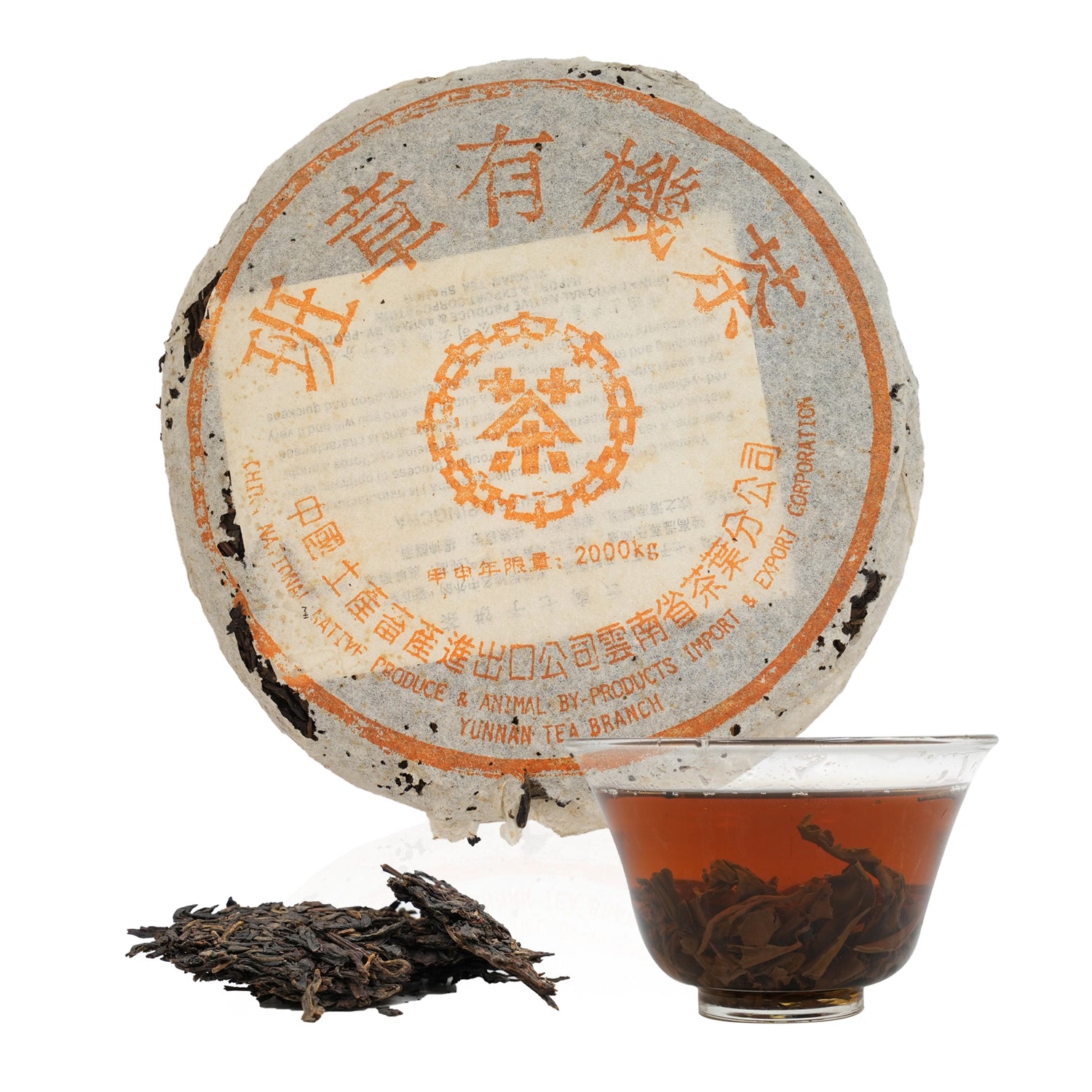
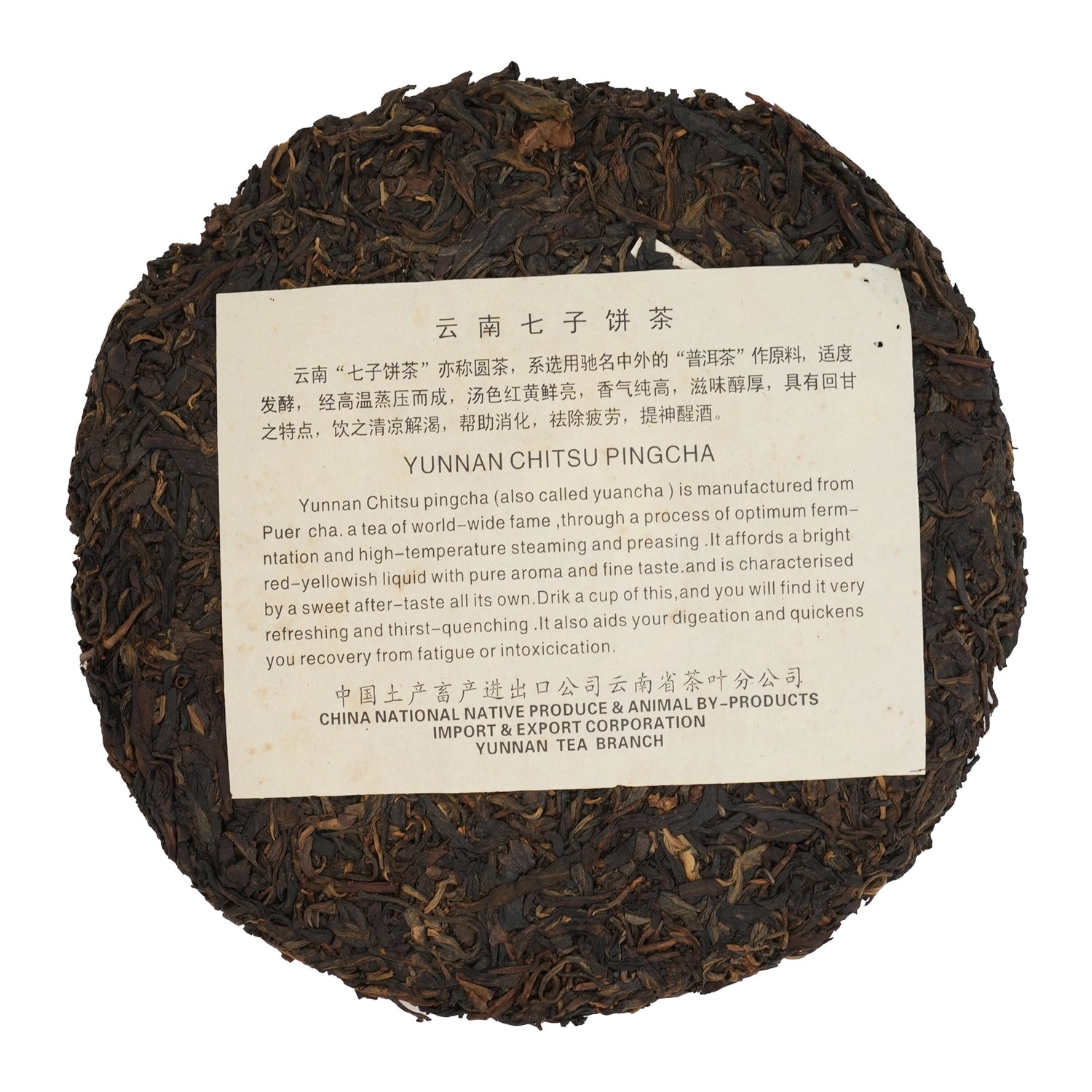
Выдержанный чай - прессованный чай Yunnan Qi Zi, сырой чай Pu-erh 2004 года
$99.99 USD
Цена за единицу товара заВыдержанный чай - прессованный чай Yunnan Qi Zi, сырой чай Pu-erh 2004 года
$99.99 USD
Цена за единицу товара заВ процессе выдержки и транспортировки выдержанного чая упаковка и сам чай могут быть повреждены. Пожалуйста, будьте осторожны при покупке, если вас это беспокоит.
Рекомендуемая покупка
Этот чай Yunnan Qi Zi Bing 2004 года — традиционный чай пуэр, изготовленный из чайных листьев, собранных летом на известных органических чайных плантациях Ban Zhang в провинции Юньнань. Известный своим глубоким, богатым вкусовым профилем, этот чай подвергается умеренной ферментации, пропаривается и прессуется в круглую форму. С ярким оранжево-красным настоем и отчетливым ароматом камфоры этот чай имеет насыщенный, мягкий вкус с сохраняющейся сладостью. По мере старения чая горькие и вяжущие ноты исчезают, оставляя освежающее, охлаждающее послевкусие, которое идеально подходит для пищеварения и омоложения. Этот чай идеально подходит для тех, кто ценит смелые характеристики чая пуэр и особый вкус Ban Zhang. Этот продукт остается в своей оригинальной упаковке и больше не доступен на рынке.
Основные сведения о чае «Юньнань Ци Цзы Бин»
- Происхождение: Юньнань, Китай
- Дата производства: 2004
- Класс: Второй класс
- Сорт чая: Юньнаньский крупнолистовой
- Мастерство: Умеренно ферментированный, затем пропаренный и спрессованный в круглые лепешки.
- Особенности вкуса: камфорный аромат, сильная, но быстро исчезающая горечь, прозрачный оранжево-красный напиток с длительной сладостью.
- Хранение: Естественное хранение в Дунгуане при небольшой влажности, без посторонних привкусов.
Что такое чай «Юньнань Ци Цзы Бин»?
Чай Yunnan Qi Zi Bing, также известный как «круглый чай», представляет собой особый тип прессованного чая пуэр, изготовленного из высококачественных листьев из знаменитых чайных садов Ban Zhang в Юньнани. Известный своим крепким, насыщенным вкусом, чай проходит тщательную ферментацию и пропаривание перед прессованием в круглые лепешки, что позволяет вкусам раскрываться с течением времени. Его мягкий, слегка горьковатый вкус трансформируется со временем, раскрывая богатый, мягкий характер. По мере того, как он продолжает стареть, этот чай становится все более мягким и сбалансированным, с заметным охлаждающим и освежающим послевкусием.
Рекомендуемые методы заваривания
-
Гайвань Пивоварение
- 100мл Гайвань
- 95 ℃ -100 ℃
- 5-7 раз
- 1:15 - 1:25 |
- 10~20 секунд
-
Термос для заваривания
- 1 г чая на 100 мл (3,4 унции) воды
- Используйте кипящую воду (212 ° F)
- Время настаивания: 1-2 часа
- Инструмент: Термос с изоляцией
-
Метод кипячения
- Добавьте 1 г чая на 100 мл (3,4 унции) воды.
- Кипятить 1-2 минуты, затем дать постоять 2-3 минуты.
- Для каждой дополнительной заварки увеличивайте время кипячения на 3 минуты.
- Для лучшего вкуса рекомендуется использовать керамический или стеклянный чайник.
- Наслаждайтесь 3-4 порциями кофе
Правила хранения
Храните этот чай в хорошо проветриваемом, сухом помещении с уровнем влажности ниже 45% и температурой ниже 25 ° C (77 ° F). Берегите его от сильных запахов, света и воздействия воздуха. Правильное хранение гарантирует, что чай сохранит свой вкус и продолжит изящно стареть с течением времени.
Вес и упаковка
Вес нетто: 357 г (12,6 унций)
Тип упаковки: В бумажной обертке
О происхождении чая
Этот чай Yunnan Qi Zi Bing Tea поставляется из высококачественных чайных садов Ban Zhang, которые славятся производством некоторых из лучших чаев пуэр. Расположенный в южной части Юньнани, регион Ban Zhang имеет долгую историю выращивания чая, и его листья ценятся за их крепкий вкус и способность хорошо вызревать с течением времени. Чай тщательно производится компанией Yunnan Tea Import and Export Company, которая известна своей приверженностью высоким стандартам в производстве чая.
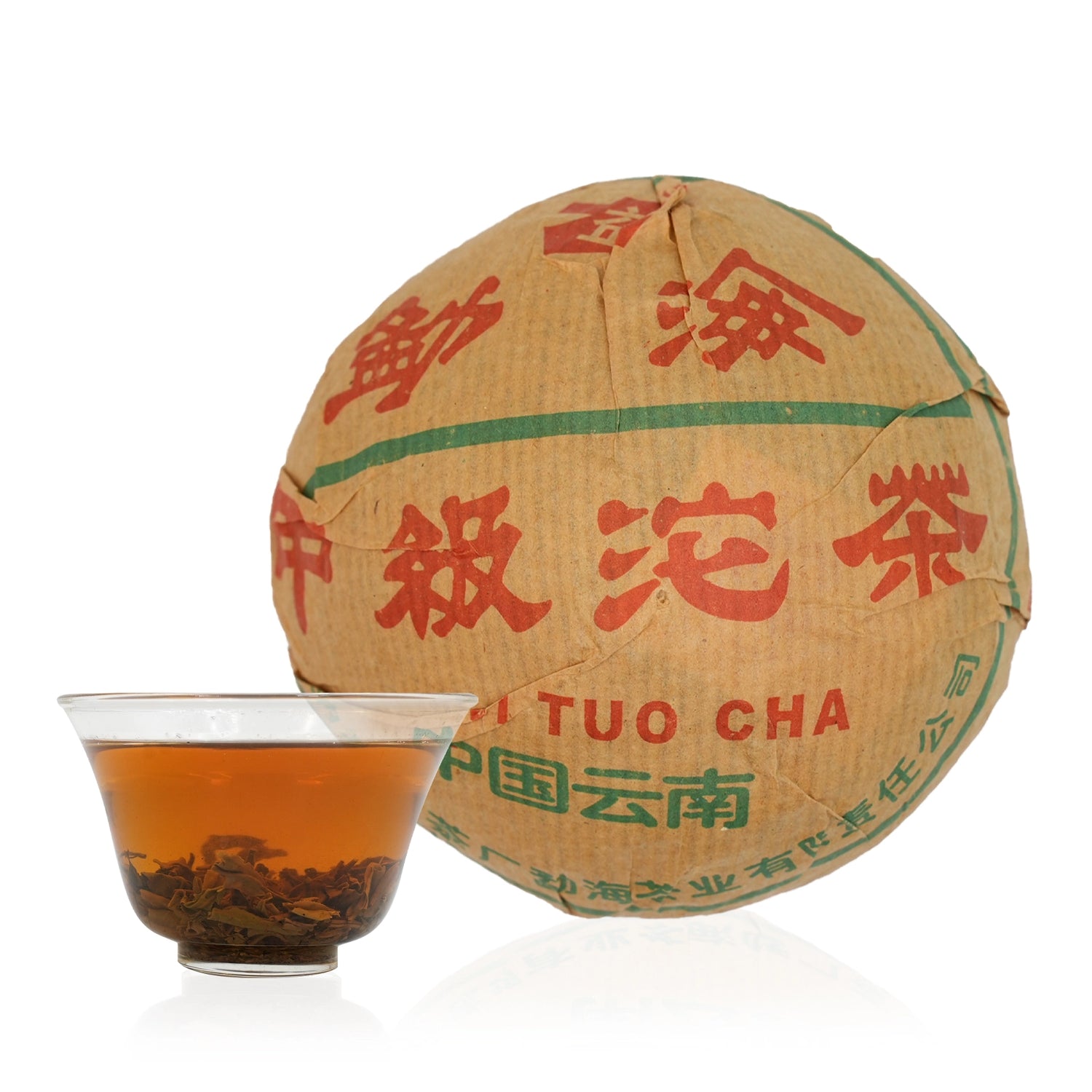
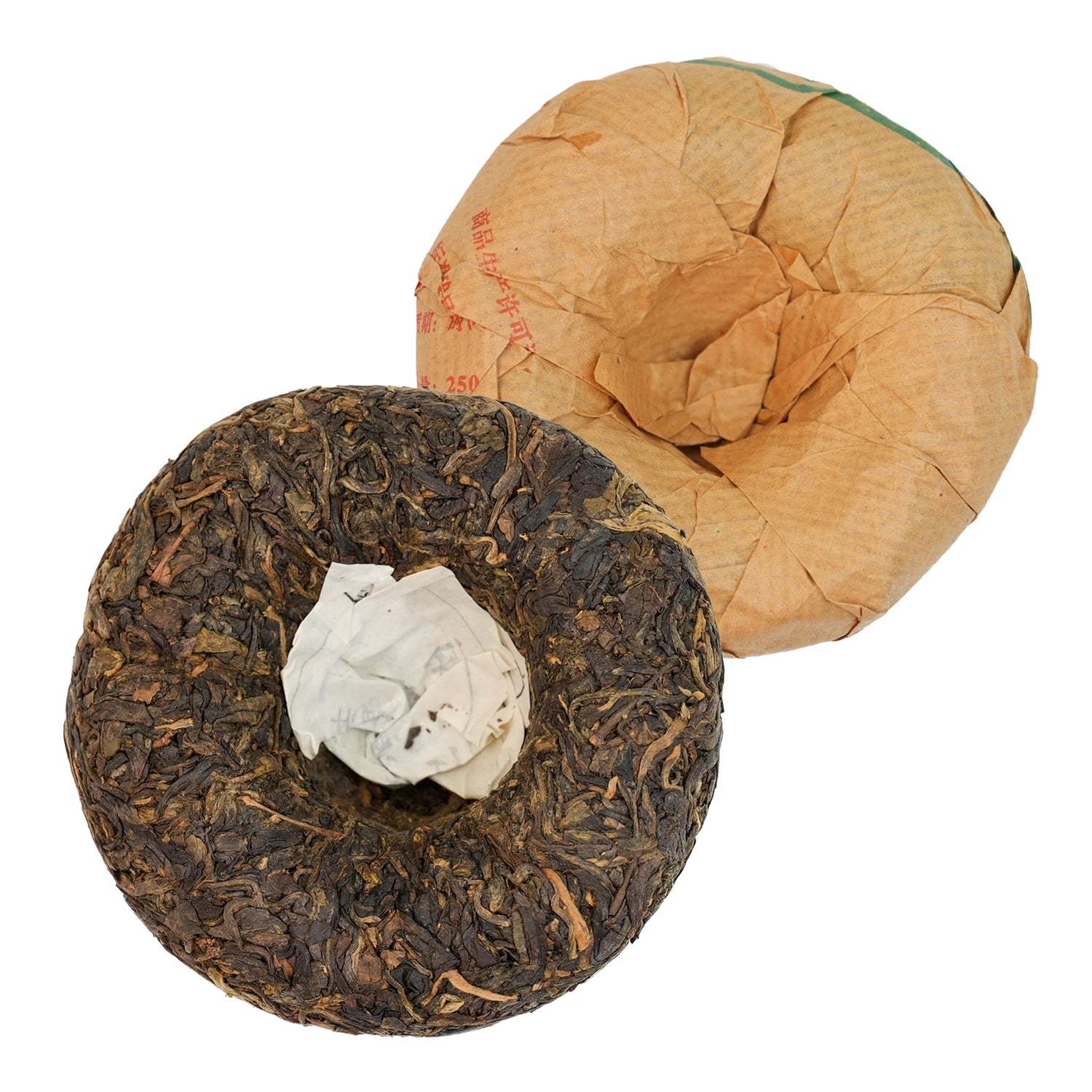
Выдержанный чай - чай Пуэр Туо из провинции Юньнань 2003 года
От $59.99 USD
Цена за единицу товара заВыдержанный чай - чай Пуэр Туо из провинции Юньнань 2003 года
От $59.99 USD
Цена за единицу товара заРекомендуемая покупка
Этот чай Yunnan Pu'er Tuo, произведенный в 2003 году и выдержанный в течение 22 лет на сухом северном складе, изготовлен из сортов крупнолистового чая Yunnan, собранных в основных районах выращивания чая в регионе. Это премиальный чай Tuo, произведенный на фабрике Menghai Tea Factory в провинции Юньнань, известной своим изысканным выбором материалов и скрупулезным мастерством. Этот чай больше не доступен на рынке.
Чай имеет уникальный вид чаши, с отчетливым выдержанным ароматом и богатым, сложным профилем. Его вкус мягкий, освежающий и гладкий, со сладкой, бархатистой текстурой и длительным послевкусием. Этот редкий и очень востребованный чай является классическим ранним шедевром Даи (Мэнхай), который ценят как коллекционеры, так и ценители.
Основные сведения о чае «Юньнань Пуэр Туо» 2003 года
- Происхождение: Сишуанбаньна, провинция Юньнань, Китай.
- Дата производства: 2003 г.
- Класс: Первый класс
- Сорт чая: Юньнаньский крупнолистовой сорт
- Мастерство:Используя собранные вручную чайные листья в качестве сырья, свежие листья обрабатываются путем завяливания, фиксации, скручивания и сушки на солнце для создания высушенного на солнце чая. Высушенный на солнце чай затем пропаривается и прессуется в форму чая Пуэр То. Наконец, чай проходит 22 года естественной выдержки в сухой среде хранения, что позволяет ему развить свой уникальный характер и глубину.
- Вкусовые особенности: Чай демонстрирует отчетливый выдержанный аромат с богатым и сложным профилем. Его вкус мягкий, освежающий и гладкий, с бархатистой текстурой, высокой сладостью и длительным послевкусием.
Что такое чай «Юньнаньский Пуэр То»?
Чай Пуэр Туо из Юньнаня — традиционный и самобытный чай из провинции Юньнань, известный своей уникальной формой, напоминающей толстостенную чашу с вогнутым центром. Он плотно спрессован и аккуратно сформирован, изготовлен из чая Пуэр в качестве сырья.
Темный чай Туо делится на два вида:
Сырой Туо (Шэн Туо): прессуется непосредственно из высушенных на солнце сырых чайных листьев, отличается темным, глянцевым цветом, свежим ароматом и сладким послевкусием.
Зрелый Туо (Шоу Туо): ферментируется методом искусственной ферментации в кучах, в результате чего получается красновато-коричневый цвет и насыщенный, мягкий вкус.
Чай Пуэр Туо имеет долгую историю, записи о нем датируются династией Мин в книге «Дянь Люэ». В 1986 году 100-граммовый чай Туо, произведенный на чайной фабрике Юньнань Сягуань, получил премию «Золотой петух» в Париже, Франция.Современные исследования подтвердили его значительную пользу для здоровья. Клинические испытания французских и китайских медицинских учреждений показали, что он может снижать уровень липидов и холестерина в крови, а также помогать в лечении ожирения, гипертонии и атеросклероза.Настой чая известен своим стойким цветом, ароматом и вкусом, сочетающим культурное наследие со свойствами, способствующими укреплению здоровья. Он получил международное признание за свои уникальные качества.
Советы по завариванию и наслаждению
Этот чай воплощает в себе уникальную трансформацию, привнесенную временем. Первое заваривание может служить «пробуждением чая», чтобы активировать внутренние качества чая, усиливая его вкусовой профиль. Чай Туо — это тип прессованного чая. Перед завариванием используйте специальный чайный нож или лопатку, чтобы аккуратно разломить чай Туо на кусочки подходящего размера. Избегайте применения чрезмерной силы, чтобы не повредить чайные листья.
Рекомендуемые методы заваривания
- Емкость: 100 мл Гайвань
- Температура воды: 90-100℃
- Время заваривания: 7-8 раз
- Соотношение чая и воды: около 1:20 (регулируйте по своему вкусу)
- Время заваривания один раз: 10-20 секунд (регулируйте по своему вкусу). Первый раз в качестве пробуждающего чая может занять 3 секунды.
Правила хранения
Чтобы обеспечить наилучшее качество чая, идеальный способ хранения — хранить его в вакуумной упаковке в прохладном, темном и сухом месте. Избегайте воздействия сильных запахов и воздуха. Для герметичного хранения рекомендуется использовать жестяную банку или металлическую банку с двойной крышкой. Для еще лучшего результата вы можете хранить герметично закрытый чай в холодильнике или сухом контейнере для хранения.
Вес и упаковка
Вес: 3,5 унции (100 г)/8,8 унции (250 г)
Тип упаковки: Упаковка из крафт-бумаги
О Мэнхайской чайной фабрике
Menghai Tea Factory — это образцовое предприятие в индустрии чая пуэр. Основанная в 1940 году в уезде Мэнхай, Сишуанбаньна, Юньнань — родине чайных деревьев и основном регионе производства чая пуэр — она является старейшей профессиональной чайной компанией в Юньнани. Фабрика объединяет выращивание, обработку и продажу, а ее флагманский бренд «Dayi» предлагает сотни сортов, включая чай пуэр, черный чай и зеленый чай. Ее репрезентативная продукция, 7572 Ripe Cake и 7542 Raw Cake, широко признана золотым стандартом качества чая пуэр.
Фабрика внесла выдающийся вклад в современное развитие чая Пуэр: она была пионером и первой применила технологию искусственной постферментационной выдержки, что стало инновационным процессом в обработке чая Пуэр. Она также возглавила крупномасштабное производство чая Yunnan Seven Sons Cake Tea, установив классическую форму в отрасли. Сегодня фабрика владеет современным перерабатывающим предприятием площадью 380 акров и двумя экологическими чайными садами площадью 10 000 акров в Бада и горе Буланг, что создает всеобъемлющую цепочку производства.
Благодаря своим глубоким историческим корням и технологическим инновациям, Menghai Tea Factory продолжает лидировать в развитии индустрии чая Pu'er. Ее продукция высоко ценится как для питья, так и для коллекционирования, заслужив всемирное признание потребителей.
Рекомендуемая покупка
Ключевые сведения о сыром чае Yiwu Cake
- Происхождение: Иу, провинция Юньнань, Китай.
- Дата производства: 2010
- Класс: Первый класс
- Сорт чая: Юньнаньский крупнолистовой сорт
- Мастерство: Этот чай производится из высушенных на солнце сырых чайных листьев крупнолистового сорта Юньнань, обработанных традиционными методами, включая завяливание, скручивание, разминание, прессование и высокотемпературную обработку паром, для создания очищенного продукта. Затем он естественным образом выдерживается в сухой среде хранения в течение 15 лет, что позволяет ему развить свой уникальный характер и глубину.
- Особенности вкуса: чай обладает сильным, стойким ароматом, богатым и мягким вкусом, сладким и освежающим послевкусием, а также отличной стойкостью для многократного заваривания.
Что такое сыроедческий чай Иу?
Чай Yiwu Raw Cake — классический шедевр в мире чая пуэр. Он изготавливается из высушенных на солнце сырых чайных листьев, собранных с экологически чистых чайных деревьев в чайном регионе Иу в начале весеннего сезона, из сырья, полученного из лучших районов выращивания. Чайный блин имеет цвет от темно-зеленого до черного, с умеренным уровнем сжатия, четко видимыми чайными нитями и толстым, мягким и равномерно ярким заваренным листом.
Чай Yiwu Raw Cake Tea наследует поколения традиционного мастерства приготовления чая, сочетая в себе нежный, но крепкий характер с потенциалом улучшения с возрастом, становясь все более ароматным с течением времени. Это вечная классика, сформированная как течением времени, так и преданностью искусных мастеров чайного дела.
Советы по завариванию и наслаждению
Этот чай воплощает в себе уникальную трансформацию, которую приносит время. Первый настой может служить «пробуждением чая», чтобы активировать внутренние качества чая, усиливая его богатый и мягкий вкус. Для лучшего опыта рекомендуется использовать традиционные методы заваривания, чтобы полностью раскрыть его выдержанные характеристики.
Рекомендуемые методы заваривания
Гайвань Пивоварение
- Емкость: 100 мл Гайвань
- Вода: минеральная вода или очищенная вода
- Температура воды: 100℃
- Время заваривания: 7-8 раз
- Соотношение чая и воды: около 7:100 (регулируйте по своему вкусу)
- Время заваривания один раз: около 5 секунд (регулируйте по своему вкусу). Рекомендуется вылить первые два настоя и начать пить с третьего настоя.
Правила хранения
Чтобы обеспечить наилучшее качество чая, идеальный способ хранения — хранить его в вакуумной упаковке в прохладном, темном и сухом месте. Избегайте воздействия сильных запахов и воздуха. Для герметичного хранения рекомендуется использовать жестяную банку или металлическую банку с двойной крышкой. Для еще лучшего результата вы можете хранить герметично закрытый чай в холодильнике или сухом контейнере для хранения.
Вес и упаковка
Вес: 12,6 унций (357 г)
Тип упаковки: Бумажная упаковка
Рекомендуемая покупка:
Этот продукт, появившийся в 2003 году, представляет собой тип кирпичного чая, известного как чай Ми Чжуань, который хранился на сухом складе на севере в течение 22 лет. Он изготовлен из высококачественного черного чая путем пропаривания и прессования. Произведенный на известной чайной фабрике Чжао Ли Цяо в провинции Хубэй, он тщательно обработан в соответствии с традиционными методами обработки. Чайные листья, используемые в качестве сырья, такие же мелкие, как зерна риса, отсюда и название «Ми Чжуань» (рисовый кирпич). Этот чай больше не доступен на рынке. Поверхность кирпича имеет темный, глянцевый цвет с изысканными узорами и четкими краями. Заваренный чай представляет собой темно-красный, яркий настой с выраженным лекарственным ароматом и мягким, гармоничным вкусом, что делает его желанным выбором для любителей выдержанного темного чая.
Основные сведения о темном чае Mi Zhuan Tea:
- Происхождение: город Чиби, провинция Хубэй, Китай
- Дата производства: 2003 г.
- Сорт: Особый сорт
- Сорт чая : Крупнолистовой чай Ичан
- Мастерство: Чай Mi Zhuan производится в соответствии с принципами производства чая Qing Brick, используя в качестве сырья мелко измельченные листья черного чая. Процесс включает просеивание, смешивание, прессование, извлечение из формы, проверку, сушку и упаковку. Этот чай был выдержан естественным образом в течение 22 лет в сухой складской среде и упакован в бумажную упаковку.
- Вкусовые особенности : Он демонстрирует выраженный лекарственный аромат с богатым, темно-красным ликером. Вкус мягкий и гладкий, предлагающий сложные и многослойные ароматы.
Что такое темный чай Ми Чжуань?
Чай Ми Чжуань (чай из рисовых кирпичей) — уникальный прессованный чай, который производится в Янлоудун, древнем городе в городе Чиби провинции Хубэй, известном как «Родине китайского кирпичного чая». Это разновидность прессованного чая, а именно кирпичного чая. Чайные листья, используемые в качестве сырья, такие же мелкие, как зерна риса, отсюда и название «Ми Чжуань» (чай из рисовых кирпичей).
Готовый продукт визуально поражает, с четко очерченными краями, элегантными узорами поверхности и глянцевой, темной поверхностью. При заваривании чай дает темно-красный настой с чистым, мягким ароматом и богатым, насыщенным вкусом.
Традиционно чай Ми Чжуань потребляли люди, живущие в холодном климате, из-за высокого содержания витаминов, что помогает компенсировать нехватку свежих фруктов и овощей зимой. В основном он продается в Синьцзяне и Северном Китае, а также экспортируется в Россию и Монголию. В последние годы небольшие партии также попали в Европу и Америку, что сделало его отличительным и исключительным красным кирпичным чаем среди китайских кирпичных чаев.
Советы по завариванию и наслаждению
Этот чай воплощает в себе уникальную трансформацию, привнесенную временем. Первое заваривание может служить «пробуждением чая», чтобы активировать внутренние качества чая, усиливая его вкусовой профиль. Чай Mi Zhuan (рисовый кирпичный чай) имеет форму кирпича. Перед завариванием используйте специальный нож для кирпичного чая или пику, чтобы аккуратно разломить кирпич на кусочки подходящего размера. Избегайте применения чрезмерной силы, чтобы не повредить чайные листья.
Рекомендуемые методы заваривания:
Гайвань Пивоварение
- Емкость: 100 мл Гайвань
- Температура воды: 95℃-100℃
- Время заваривания: 5-7 раз
- Соотношение чая и воды: около 1:25 (регулируйте по своему вкусу)
- Время заваривания один раз: 10–20 секунд (регулируйте по своему вкусу). Первый раз в качестве пробуждающего чая может потребоваться 3–5 секунд.
Метод кипячения
Положите поломанные кусочки чая Mi Zhuan (чай из рисовых кирпичей) в заварник и добавьте их в чайник. Используйте соотношение чая и воды примерно 1:150, начиная с холодной воды. Доведите воду до кипения, затем дайте ей настояться в течение 1-2 минут перед употреблением. Выньте заварник из чайника, чтобы чай не стал слишком крепким.
Для последующих заварок следуйте тому же методу. Одно заварочное устройство можно использовать для 3-4 заварок.
Правила хранения:
Чтобы обеспечить наилучшее качество чая, идеальный способ хранения — хранить его в вакуумной упаковке в прохладном, темном и сухом месте. Избегайте воздействия сильных запахов и воздуха. Для герметичного хранения рекомендуется использовать жестяную банку или металлическую банку с двойной крышкой. Для еще лучшего результата вы можете хранить герметично закрытый чай в холодильнике или сухом контейнере для хранения.
Вес и упаковка:
Вес: 35,3 унции (1000 г)
Тип упаковки: Бумажная упаковка
О чайной фабрике Хубэй Чжаолицяо
Фабрика чая Чжао Ли Цяо в провинции Хубэй является ведущим предприятием в китайской приграничной чайной (кирпичный чай) промышленности, с годовой производственной мощностью более 10 000 тонн. Ее история восходит к периоду Сяньфэн династии Цин (1861), когда ее предшественница, фабрика кирпичного чая Янлоудун, прославилась своим «чаем Дун». В 1953 году фабрика переехала в город Чжао Ли Цяо в городе Чиби и приняла свое нынешнее название.
Как «Временами освящённый китайский бренд» и «Национальное эталонное предприятие», фабрика сохранила многовековое мастерство. Она специализируется на производстве отличительных кирпичных чаёв, таких как Цин Чжуань, Ми Чжуань, Фу Чжуань и Люй Чжуань. Известная своим высококачественным сырьем и скрупулезными методами обработки, её продукция ценится за свою способность помогать пищеварению, согревать тело и повышать энергию. Эти чаи стали неотъемлемой частью повседневной жизни этнических меньшинств в таких регионах, как Внутренняя Монголия и Синьцзян, и экспортируются в такие страны, как Россия, Монголия, Ближний Восток, Европа и Америка.
Фабрика выигрывает от своего стратегического расположения вблизи ключевых транспортных узлов, таких как железная дорога Пекин-Гуанчжоу, что дает ей значительное логистическое преимущество. Ее продукция завоевала множество наград как на провинциальном, так и на национальном уровне, включая золотые, серебряные и бронзовые медали на первой китайской продовольственной выставке. В 2020 году она была признана частью Четвертого пакета национального промышленного наследия, что подчеркивает ее историческую значимость и социальный вклад в чайную промышленность.
Являясь эталоном в чайной индустрии, сочетающей традиционное наследие с современными возможностями, чайная фабрика Чжао Ли Цяо продолжает содействовать сохранению и всемирному распространению культуры китайского кирпичного чая.
Рекомендуемая покупка:
Этот чай Hei Zhuan (черный кирпичный чай), произведенный в 2011 году и выдержанный в течение 14 лет на сухом северном складе, изготовлен из настоящего темного необработанного чая Gao Ma Er Xi путем пропаривания и прессования. Он производится компанией Hunan Jiuyang Tea Co., Ltd. и тщательно обрабатывается с помощью таких этапов, как дробление, просеивание, ферментация, пропаривание, машинное прессование и сушка. Этот чай больше не доступен на рынке.
Кирпич имеет гладкую поверхность, четкие узоры, четко очерченные края, равномерную толщину и глянцевый темно-коричневый цвет. После многих лет выдержки он приобретает отчетливый выдержанный аромат с древесными нотками, предлагая богатый, мягкий вкус и гладкую, изысканную текстуру. Этот чай Hei Zhuan был награжден специальной золотой медалью на выставке Shanghai Tea Expo 2009, что делает его классическим шедевром от чайной фабрики Jiuyang.
Основные сведения о темном чае Hei Zhuan Tea:
- Происхождение: уезд Аньхуа, провинция Хунань, Китай
- Дата производства: 2011
- Класс: Первый класс
- Сорт чая: сорт оригинальной группы Гао Ма Эр Си
- Мастерство: Этот чай Hei Zhuan (черный кирпичный чай) производится с использованием темного необработанного чая Anhua в качестве базового материала. После того, как необработанный чай поступает на фабрику, он проходит ряд процессов, включая просеивание, веяние, дробление и смешивание, чтобы создать полуфабрикат, который соответствует строгим стандартам однородности и чистоты. Затем полуфабрикат проходит дополнительную обработку путем пропаривания, прессования, обжаривания и упаковки для получения конечного черного кирпичного чая.
- Особенности вкуса: Чай обладает ярко выраженным выдержанным ароматом с древесными нотками, богатым, мягким вкусом и гладкой, изысканной текстурой.
Что такое темный чай Хэй Чжуань?
Чай Hei Zhuan (черный кирпичный чай) назван так из-за использования в качестве основного материала темного необработанного чая (Hei Mao Cha), который придает чаю темный, глянцевый цвет и кирпичную форму при сжатии. Сырье получают из высококачественного темного необработанного чая, произведенного на чайных фабриках в Аньхуа и других уездах.
Раньше сырье делилось на два типа: поверхностный чай (высшего качества) и внутренний чай (низшего качества). Во время прессования чай более низкого качества прессовался внутри, а чай более высокого качества использовался на поверхности. Однако с начала 1970-х годов трудоемкий и длительный традиционный процесс был оптимизирован. Теперь чай смешивается в соответствующем соотношении поверхностного и внутреннего чая и прессуется за один шаг.
В процессе производства сырье сначала просеивают, формуют, провеивают и очищают. Затем его смешивают в определенных пропорциях. Для машинного прессования чай стерилизуют с помощью высокотемпературного пара, сжимают под высоким давлением, проверяют и обрезают, а затем медленно сушат перед упаковкой в окончательную форму кирпича.
При заваривании чай Hei Zhuan дает напиток цвета янтаря с богатым, мягким вкусом и чистым, чистым ароматом. Считается, что длительное употребление этого чая способствует пищеварению, регулирует обмен веществ и обеспечивает пользу для здоровья и профилактические эффекты для организма.
Советы по завариванию и наслаждению:
Этот чай воплощает в себе уникальную трансформацию, привнесенную временем. Первое заваривание может служить «пробуждением чая», чтобы активировать внутренние качества чая, усиливая его вкусовой профиль. Чай Хэй Чжуань (черный кирпичный чай) имеет форму кирпича. Перед завариванием используйте специальный нож для кирпичного чая или лопатку для чая, чтобы аккуратно разломить кирпич на кусочки подходящего размера. Избегайте применения чрезмерной силы, чтобы не повредить чайные листья.
Рекомендуемые методы заваривания:
Гайваньское пивоварение:
- Емкость: 100 мл Гайвань
- Температура воды:100℃
- Время заваривания: 5-7 раз
- Соотношение чая и воды: около 1:20 (регулируйте по своему вкусу)
- Время заваривания: 1 раз: 2–3 минуты (регулируйте по своему вкусу). Первый раз в качестве пробуждающего чая можно заваривать 3–5 секунд.
Метод кипячения:
Чтобы заварить чай Хэй Чжуань (черный кирпичный чай), начните с 10–15 граммов чая и 500 миллилитров воды. Нагрейте воду до бурного кипения, затем добавьте чай. Как только вода снова закипит, убавьте огонь до слабого кипения и дайте ему вариться в течение 2 минут. Выключите огонь, процедите чайные листья и подавайте горячим. Если вы предпочитаете более легкий вкус, вы можете изменить соотношение до 1 части чая на 15 частей воды (например, 10 граммов чая на 150 миллилитров воды) и выполнить те же действия.
Для молочного чая в центральноазиатском стиле заварите чай, как описано выше. Затем смешайте процеженный чай с молоком в соотношении 1:5 (1 часть молока на 5 частей чая). Добавьте щепотку соли по вкусу, хорошо перемешайте и наслаждайтесь этим кремовым, пикантным напитком.
Правила хранения:
Чтобы обеспечить наилучшее качество чая, идеальный способ хранения — хранить его в вакуумной упаковке в прохладном, темном и сухом месте. Избегайте воздействия сильных запахов и воздуха. Для герметичного хранения рекомендуется использовать жестяную банку или металлическую банку с двойной крышкой. Для еще лучшего результата вы можете хранить герметично закрытый чай в холодильнике или сухом контейнере для хранения.
Вес и упаковка:
Вес: 35,3 унции (1000 г)
Тип упаковки: Оригинальная запечатанная бумажная коробка, внутренняя упаковка из крафт-бумаги
О чайной фабрике Хунань Цзюян:
Hunan Jiuyang Tea Co., Ltd., основанная в 1985 году, берет свое начало в древнем городе Ючжоу, родине темного чая Аньхуа. Будучи ведущим предприятием в индустрии темного чая Хунани, Jiuyang занимается сектором темного чая уже почти четыре десятилетия без перерыва. Сейчас ее штаб-квартира находится в городе Цзяннань, родине чая Цянь Лян (чай тысячи таэлей), и может похвастаться более чем 5000 акрами высокогорных органических чайных садов на ледниковой каменистой почве и стандартизированным производственным предприятием, охватывающим более 20 000 квадратных метров.
Руководствуясь основной философией «наследия и инноваций», компания Jiuyang сохранила традиционное мастерство «Трех кирпичей» (например, Fu Brick, Hei Brick, Hua Brick), «Трех советов» (например, Tian Jian, Gong Jian, Sheng Jian) и чая Qian Liang, а также разработала более 100 современных темных чайных продуктов. Компания завоевала множество международных и внутренних наград за качество и стремится производить «премиальный темный чай» как свидетельство своей приверженности совершенству. Jiuyang продолжает продвигать культуру темного чая Anhua на мировой арене.
В процессе выдержки и транспортировки выдержанного чая упаковка и сам чай могут быть повреждены. Пожалуйста, будьте осторожны при покупке, если вас это беспокоит.
Рекомендуемая покупка
Чай Bailing Wellness Tea — это уникальный выдержанный чай Fu Brick, который происходит из традиционной чайной культуры Шелкового пути . Этот чай был создан в 1988 году компанией Hunan Tea Import & Export Company с использованием отборных чайных листьев Fu Brick и Hei Brick. После 34 лет бережной выдержки в сухих условиях хранения этот чай приобрел мягкий вкус, богатый лекарственным ароматом и мягким, слегка сладковатым послевкусием. Традиционно он был основным продуктом питания среди этнических групп Северо-Западного Китая , которые потребляют пищу с высоким содержанием жиров, но при этом поддерживают подтянутый и энергичный образ жизни. Уникальный процесс ферментации чая Bailing Wellness Tea усиливает его способность помогать пищеварению, стимулировать обмен веществ и поддерживать общее самочувствие. Этот продукт сохраняет свою оригинальную запечатанную бумажную упаковку и больше не доступен на рынке.
Основные сведения о чае Bailing Fitness
- Происхождение : провинция Хунань, Китай
- Дата производства : 1988
- Класс : Третий класс
- Сорт чая : Фу Брик, фрагменты чая Хэй Брик
- Мастерство : традиционная ферментация кирпича Фу, естественная выдержка
- Особенности вкуса : Яркий желтый ликер, насыщенный выдержанный аромат с травяными нотками, мягкий и мягкий вкус, легкая лекарственная сладость.
- Хранение : Сухое складское хранение, оригинальная герметичная упаковка.
Что такое чай «Фу Брик»?
Fu Brick Tea — это разновидность темного чая, происходящего из провинции Хунань, Китай, известного своим уникальным процессом постферментации и полезными для здоровья свойствами. Он содержит золотые цветы (Eurotium cristatum), пробиотик, полезный для пищеварения и обмена веществ. Благодаря своему длительному потенциалу выдержки, чай Fu Brick со временем приобретает сложный и мягкий вкус. Bailing Fitness Tea, выдержанный в течение 34 лет, демонстрирует насыщенный, лечебный аромат с шелковистой гладкой текстурой, что делает его ценным выбором среди любителей выдержанного чая.
Рекомендуемые методы заваривания
-
Гайвань Пивоварение
- Соотношение чая и воды: 1:20
- Температура воды: 95 ° С-100 ° С
- Настои: 6-8 раз
- Время заваривания: 10~20 секунд
-
Термос для заваривания
- Соотношение чая и воды: 1 г на 100 мл воды.
- Температура воды: 100 ° C (кипящая вода)
- Время настаивания: 1-2 часа
- Инструмент: Термос с изоляцией
-
Метод кипячения
- Соотношение чая и воды: 1 г на 100 мл воды.
- Время закипания: 1-2 минуты, затем дайте постоять 2-3 минуты.
- Повторное заваривание: продлите время заваривания на 3 минуты для каждого дополнительного заваривания.
- Подходит для: керамического или стеклянного чайника.
- Время заваривания: 3-4 заваривания
Правила хранения
Чтобы поддерживать оптимальный процесс выдержки чая , храните его в сухом и прохладном месте с влажностью ниже 45% и температурой ниже 25 ° C. Берегите его от сильных запахов, прямого света и воздействия воздуха. Правильное хранение гарантирует, что чай сохранит свой выдержанный аромат и продолжит изящно созревать с течением времени.
Вес и упаковка
- Вес нетто : 75 г
- Тип упаковки : Оригинальная запечатанная бумажная коробка с влагонепроницаемым покрытием
О компании Hunan Tea Import & Export Company
Основанная в начале 20-го века, Hunan Tea Import & Export Company является пионером в торговле чаем в Китае. Компания сыграла решающую роль в экспорте кирпичного чая Fu по Шелковому пути, сделав его основным продуктом среди этнических групп Северо-Западного Китая и Центральной Азии. Опыт компании в традиционной ферментации и хранении чая обеспечил производство высококачественных выдержанных чаев, которые выдерживают испытание временем.
Сегодня этот 34-летний чай Bailing Fitness Tea остается замечательным свидетельством чайного наследия Китая и непреходящей привлекательности чая Fu Brick.
This Pu-erh tea comes from Bulang Mountain, the core production area of Pu-erh tea. The region enjoys abundant rainfall and ample sunlight, creating ideal natural conditions for tea growth. Bulang Mountain is home to several renowned tea-producing villages, such as Lao Banzhang, Lao Man’e, and Xin Banzhang. Teas from these areas are famous for their powerful “cha qi” (tea energy), long-lasting sweetness, and strong wild mountain character, making them true classics among Pu-erh teas.
This raw Pu-erh tea was produced in the year 2000, made from a blend of leaves harvested from old tea trees and pressed into a column shape. It has been carefully stored in a dry warehouse for 25 years, allowing for slow and natural aging. The resulting tea liquor reveals distinct smoky and aged aromas, with a rich, mellow body and a lingering sweet aftertaste.
Origin: Bulang Mountain, Menghai County, Xishuangbanna Dai Autonomous Prefecture, Yunnan Province
Production Date: 2000
Tea Cultivar: Yunnan Large-Leaf Tea
Recently viewed products
Часто задаваемые вопросы
Китайский темный чай, также известный как «хэй ча», — это категория чая, которая проходит уникальный процесс постферментации. Этот процесс приводит к темному цвету и богатому вкусовому профилю, отличающемуся от других видов чая. Известные сорта китайского темного чая включают выдержанный чай Пуэр и Лю Бао, которые ценятся за их глубокий, землистый вкус и культурную значимость.
Выбор темного чая, особенно китайского темного чая, предлагает уникальный и ароматный чайный опыт, который отличает его от других видов чая. Темный чай проходит постферментацию, в результате чего получается особый вкусовой профиль, характеризующийся земляными, древесными и иногда дымными нотками. Этот процесс ферментации также усиливает пищеварительные свойства чая, делая его особенно успокаивающим для желудка. Кроме того, темный чай содержит полезные микроорганизмы, которые способствуют здоровью кишечника и общему благополучию. Благодаря своей богатой истории и пользе для здоровья выбор китайского темного чая добавляет разнообразие и глубину вашей коллекции чая и вкусу.
Черный чай имеет глубоко укоренившиеся корни в китайской чайной культуре, а такие регионы, как Юньнань и Хунань, славятся своим производством. Он имеет важное культурное значение, его часто потребляют этнические группы, проживающие на границе Китая, как основной напиток в повседневной жизни, отражая многовековые традиции и обычаи.
Одной из самых примечательных особенностей китайского темного чая является то, что он имеет тенденцию улучшаться с возрастом, но правильное хранение имеет решающее значение. Вот некоторые рекомендуемые методы хранения:
- Обеспечьте вентиляцию: храните темный чай в хорошо проветриваемом помещении, чтобы предотвратить появление влаги и плесени.
- Избегайте запахов: храните темный чай вдали от источников сильного запаха, чтобы он не впитал нежелательные привкусы.
- Хранить в защищенном от света месте: темный чай следует хранить в прохладном, темном месте, чтобы сохранить его цвет и вкус.
- Держите его в сухом месте: следите за тем, чтобы контейнеры для хранения были сухими, чтобы чай не отсырел и не покрылся плесенью; рассмотрите возможность использования герметичных контейнеров или пакетов из алюминиевой фольги.
- Регулярная вентиляция: периодически проверяйте условия хранения, чтобы обеспечить надлежащую циркуляцию воздуха, которая помогает сохранить свежесть и качество чая.
Соблюдение этих методов хранения позволит продлить срок годности темного чая и идеально сохранить его вкус и аромат.
Содержание кофеина в темном чае может зависеть от таких факторов, как тип чая и способ его заваривания. Как правило, темный чай содержит меньше кофеина, чем кофе, но больше, чем зеленый чай. Обычно темный чай безопасно пить вечером для большинства людей, но тем, кто чувствителен к кофеину, стоит избегать его ближе к сну, чтобы предотвратить возможные нарушения сна. Всегда полезно прислушиваться к своему организму и соответствующим образом корректировать потребление чая.
Chat with fellow tea lovers, ask questions, and share your tea moments.





